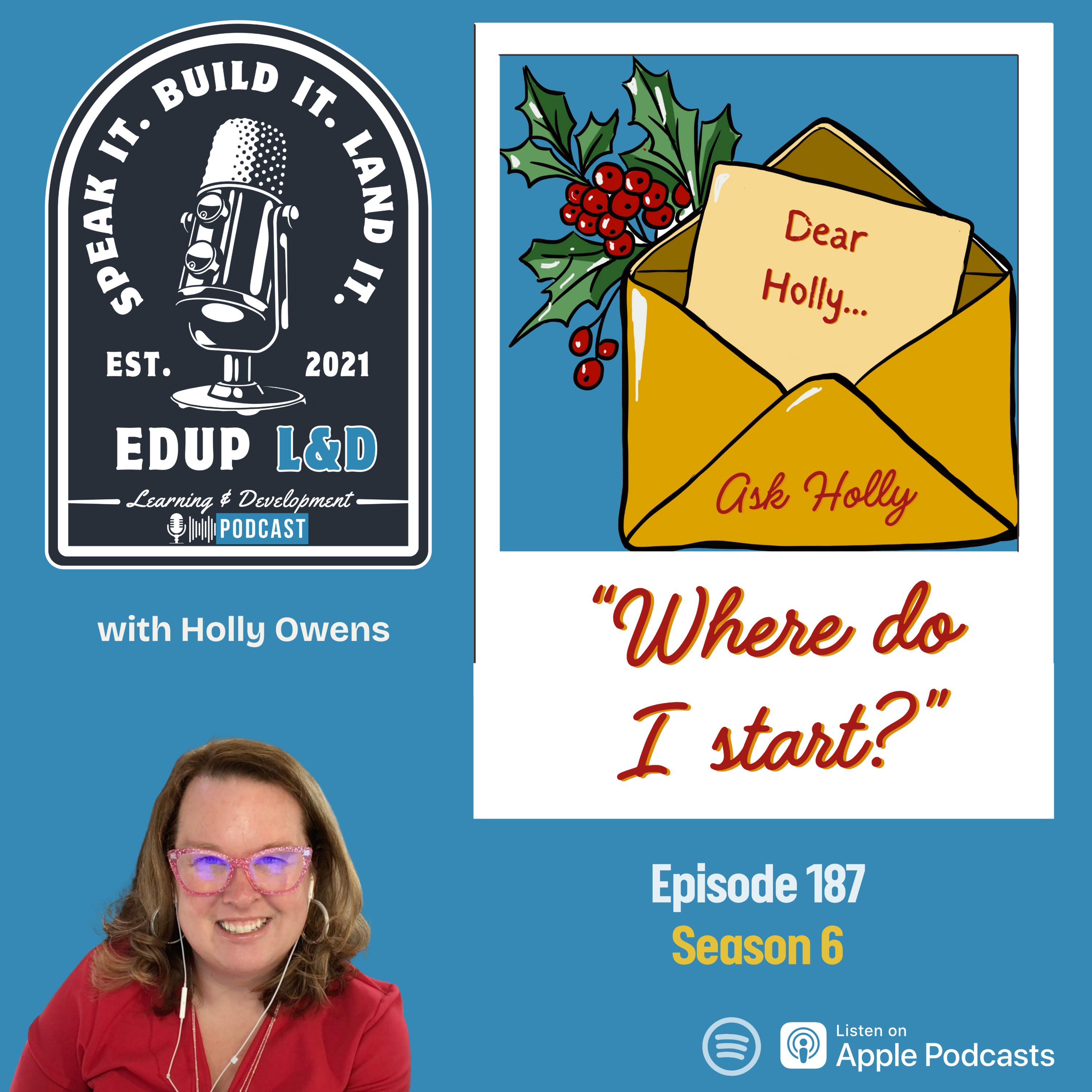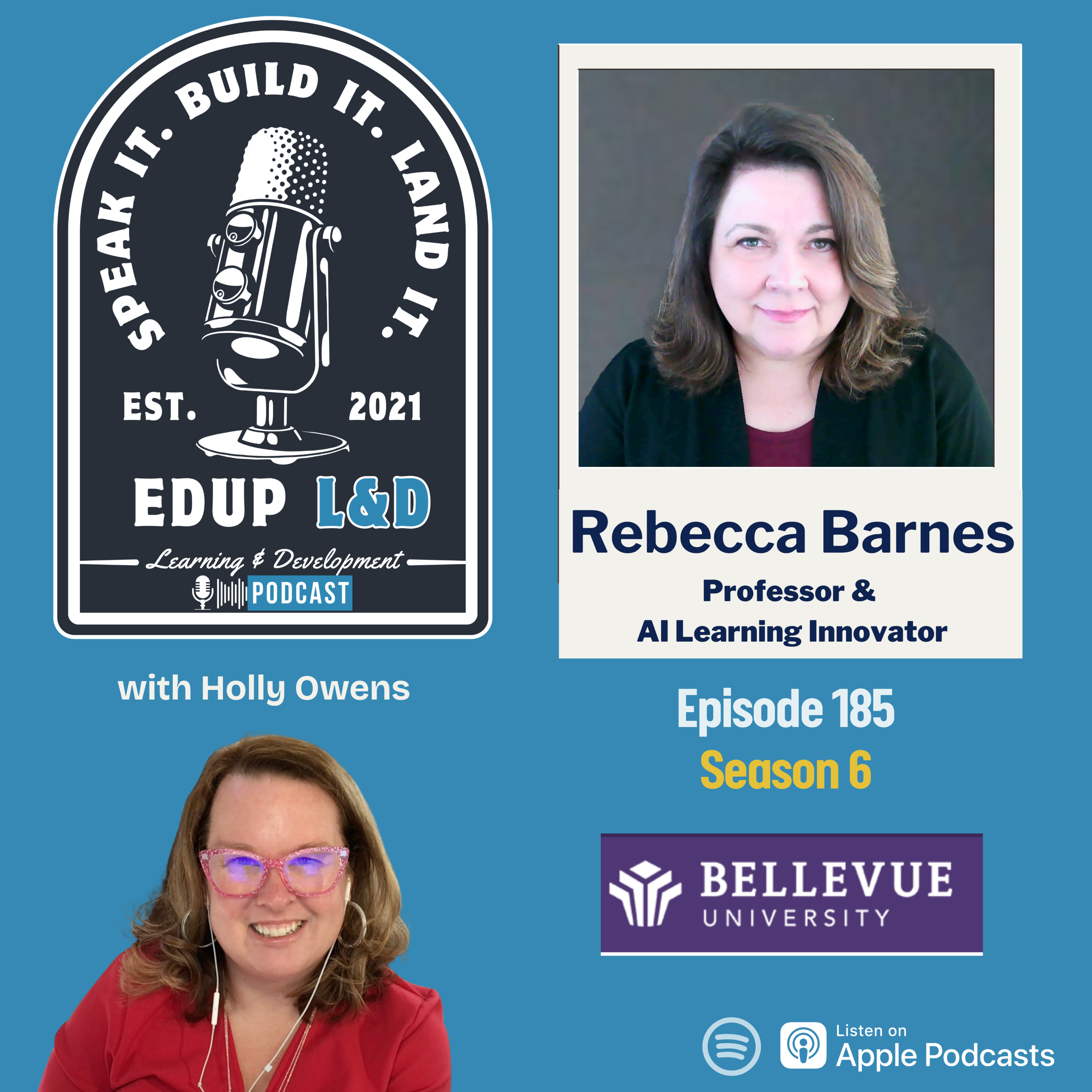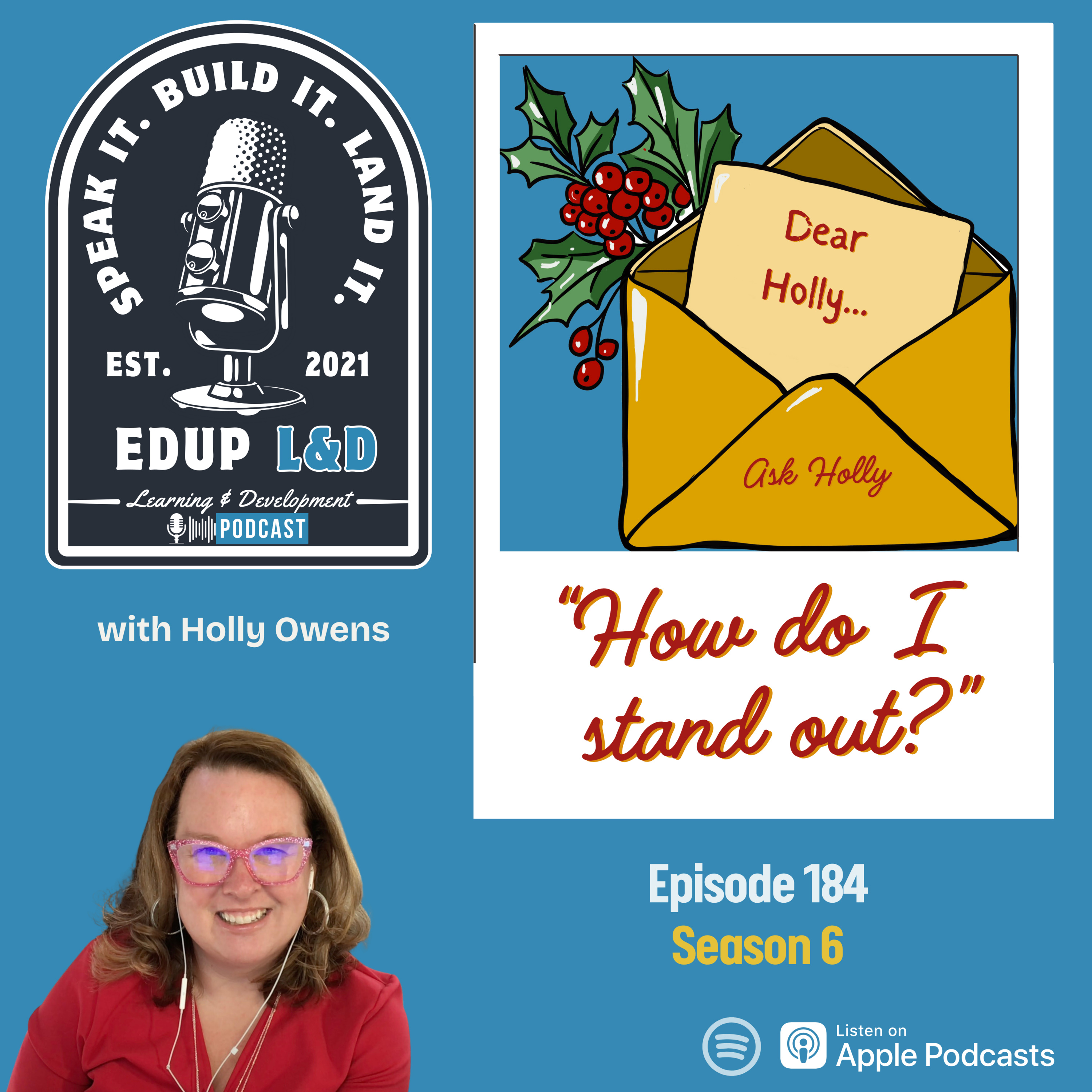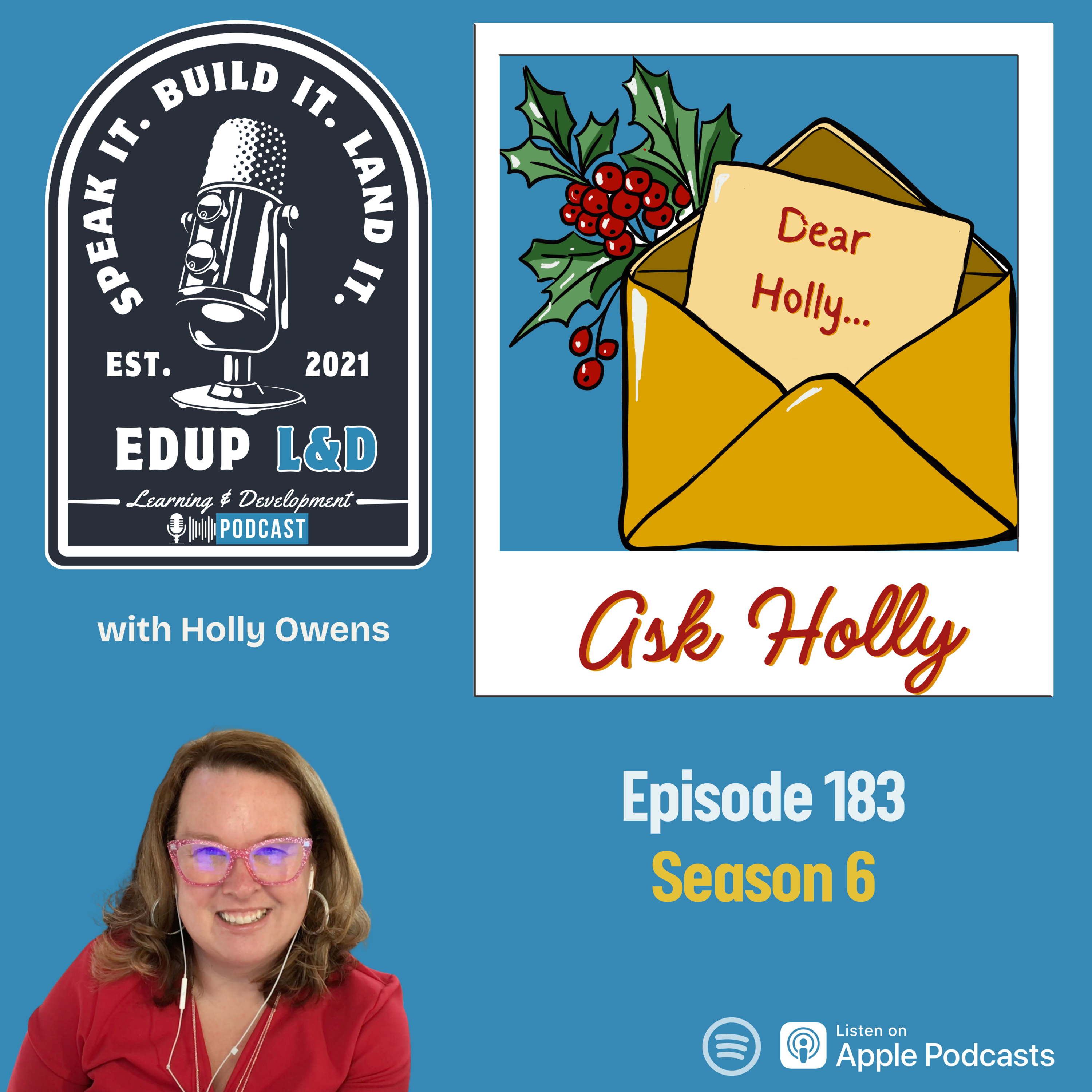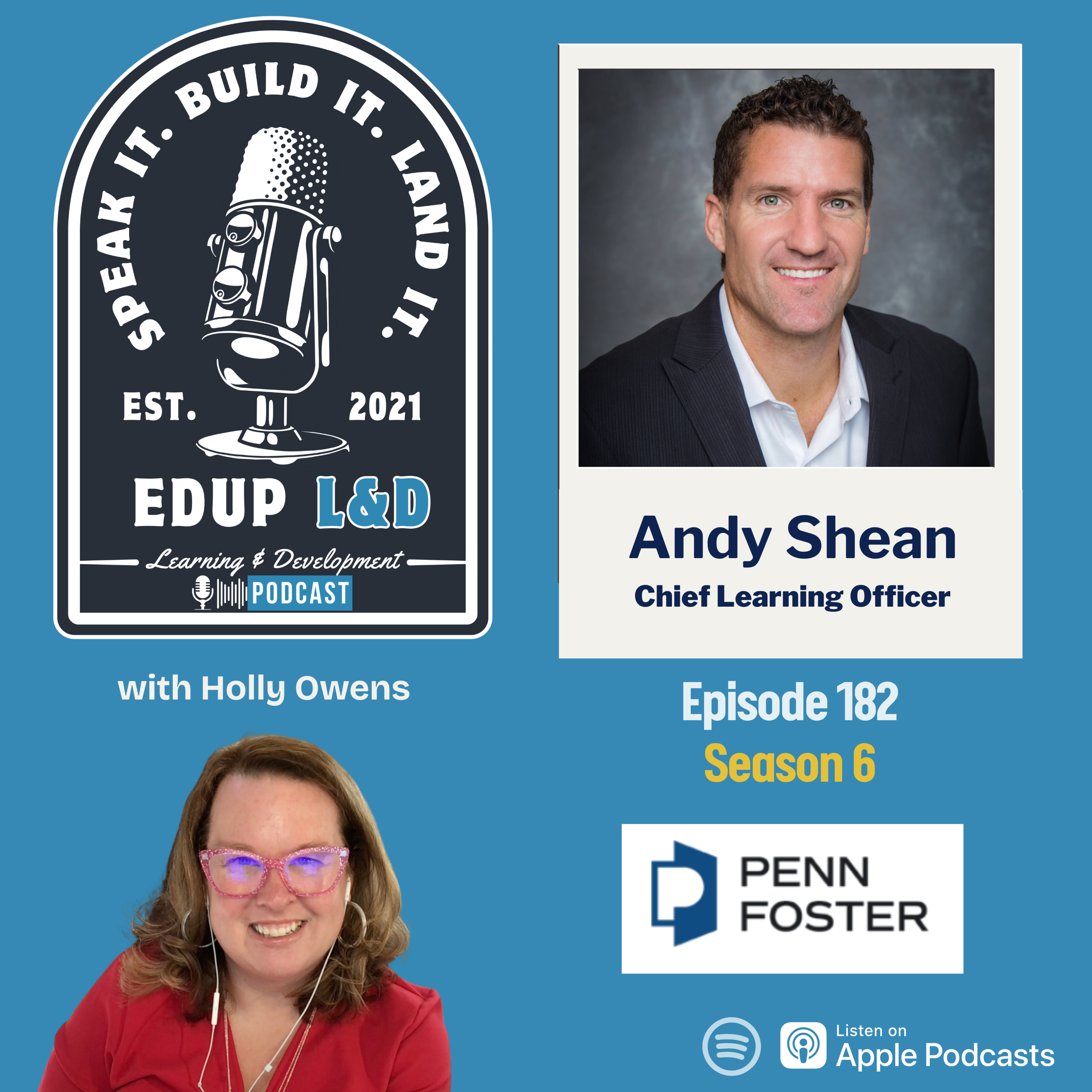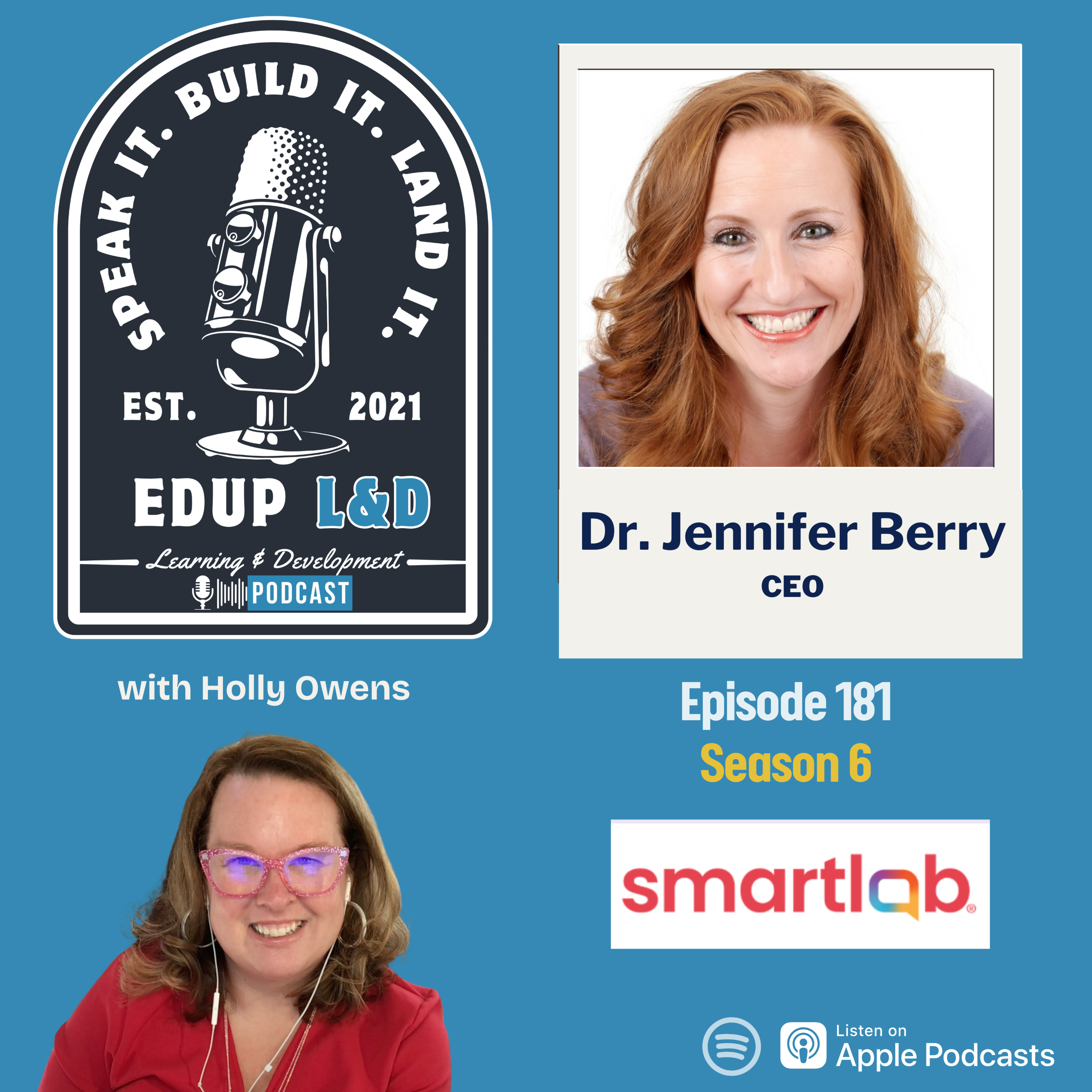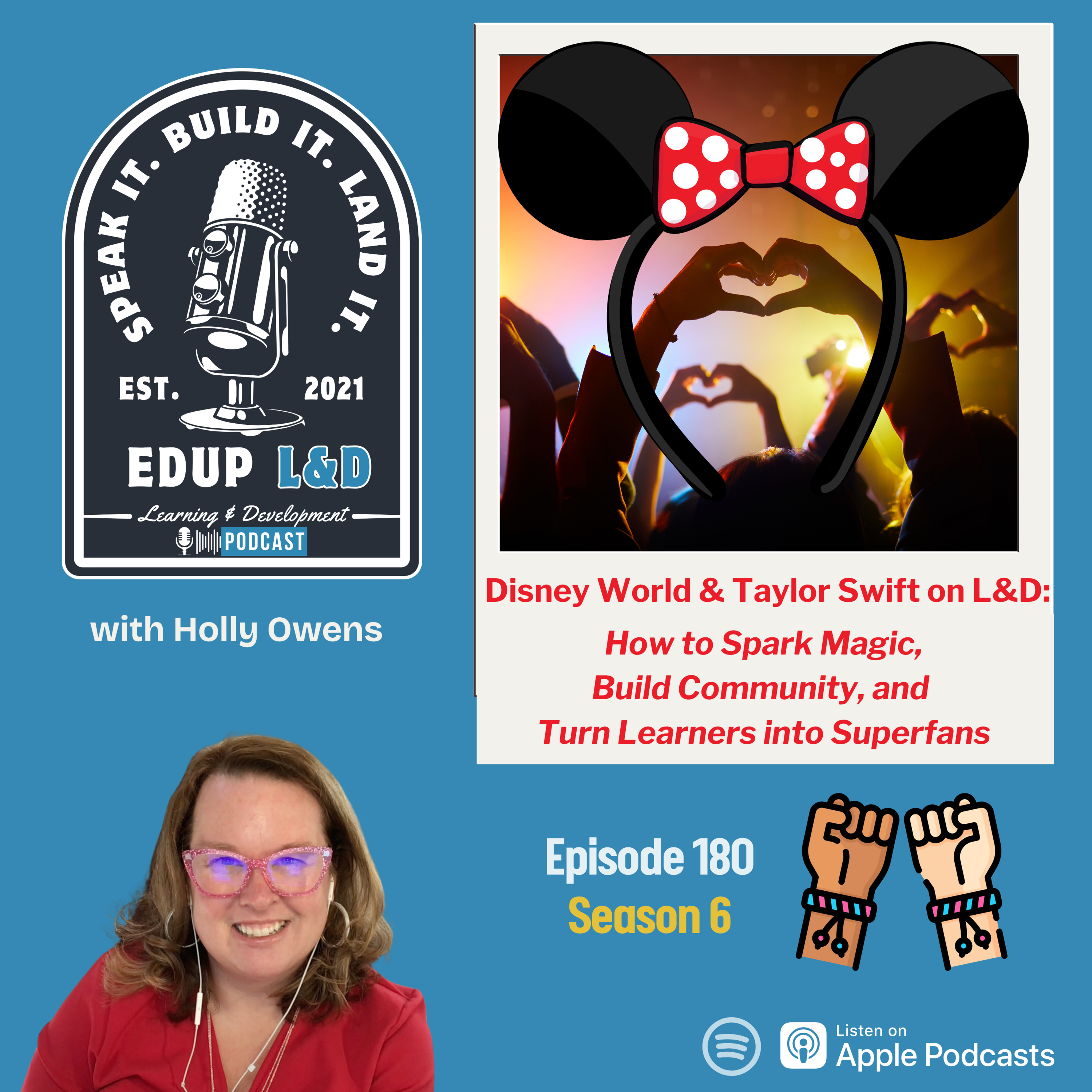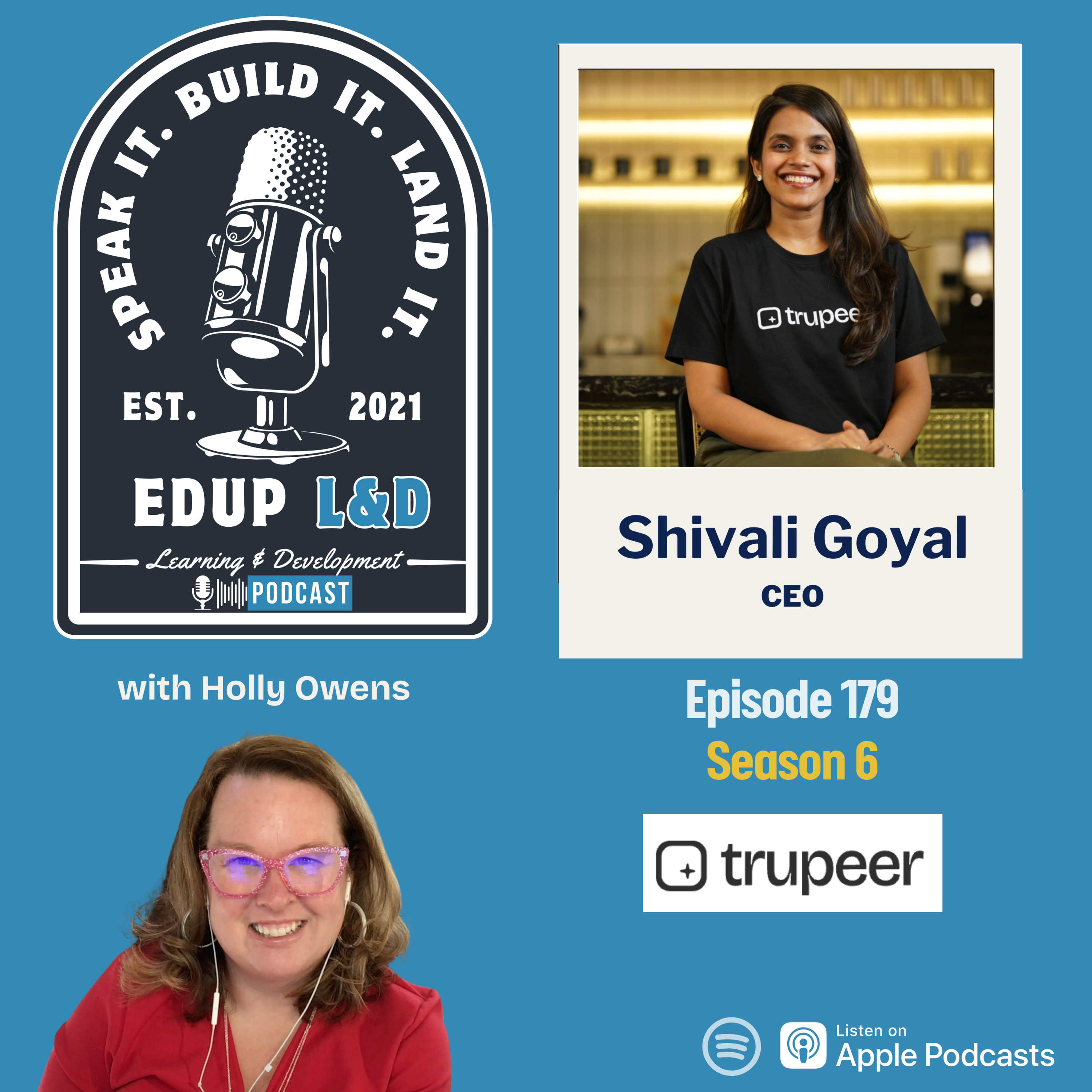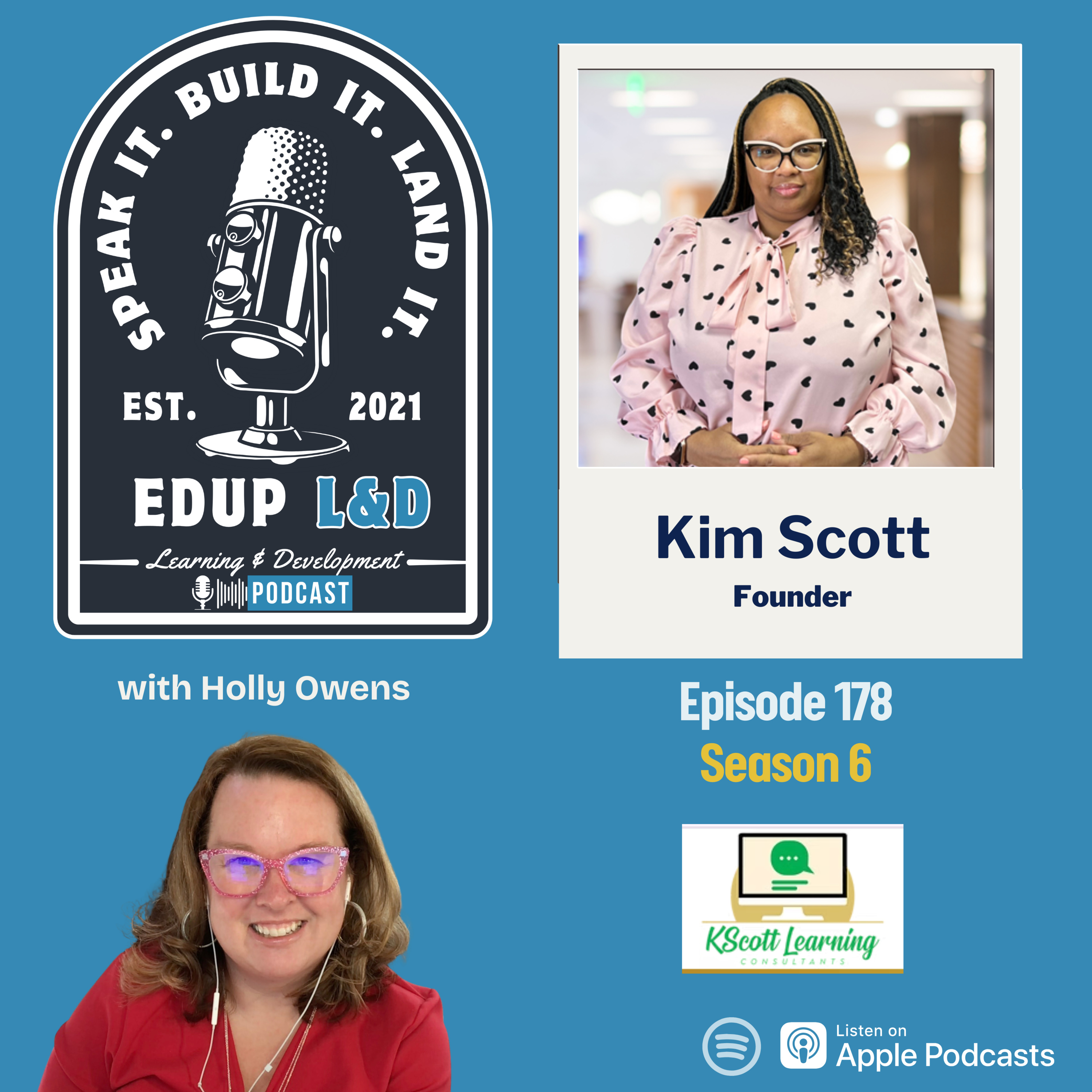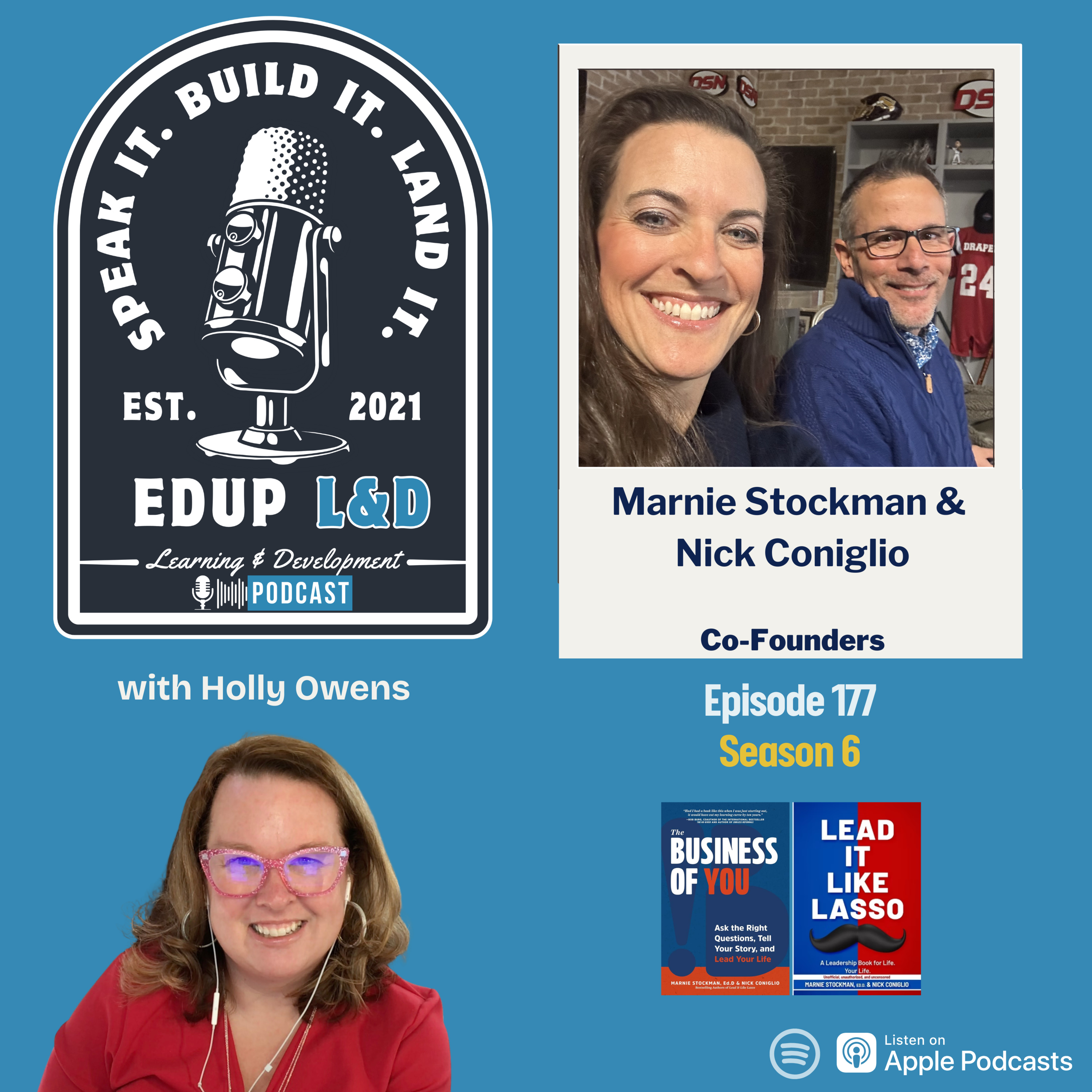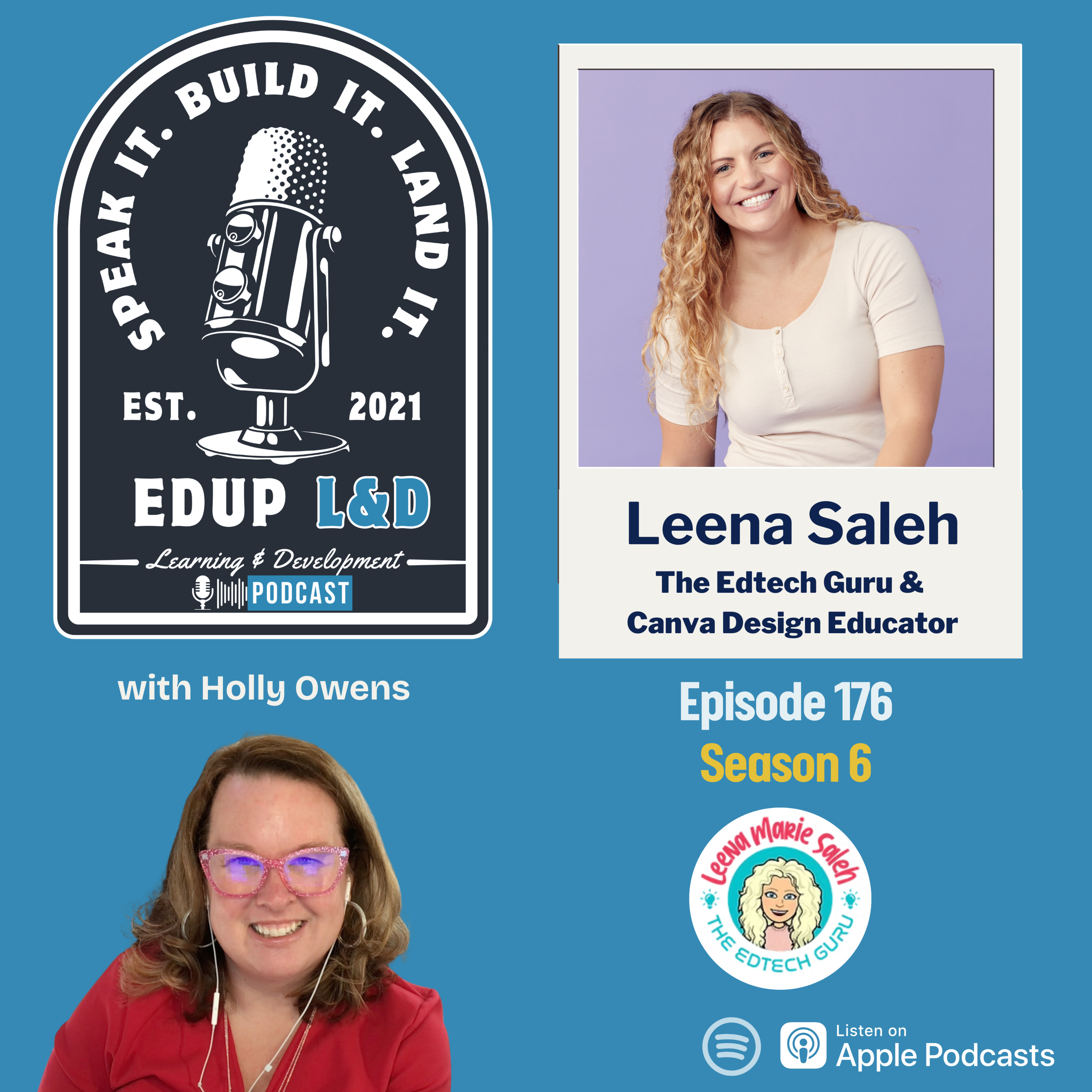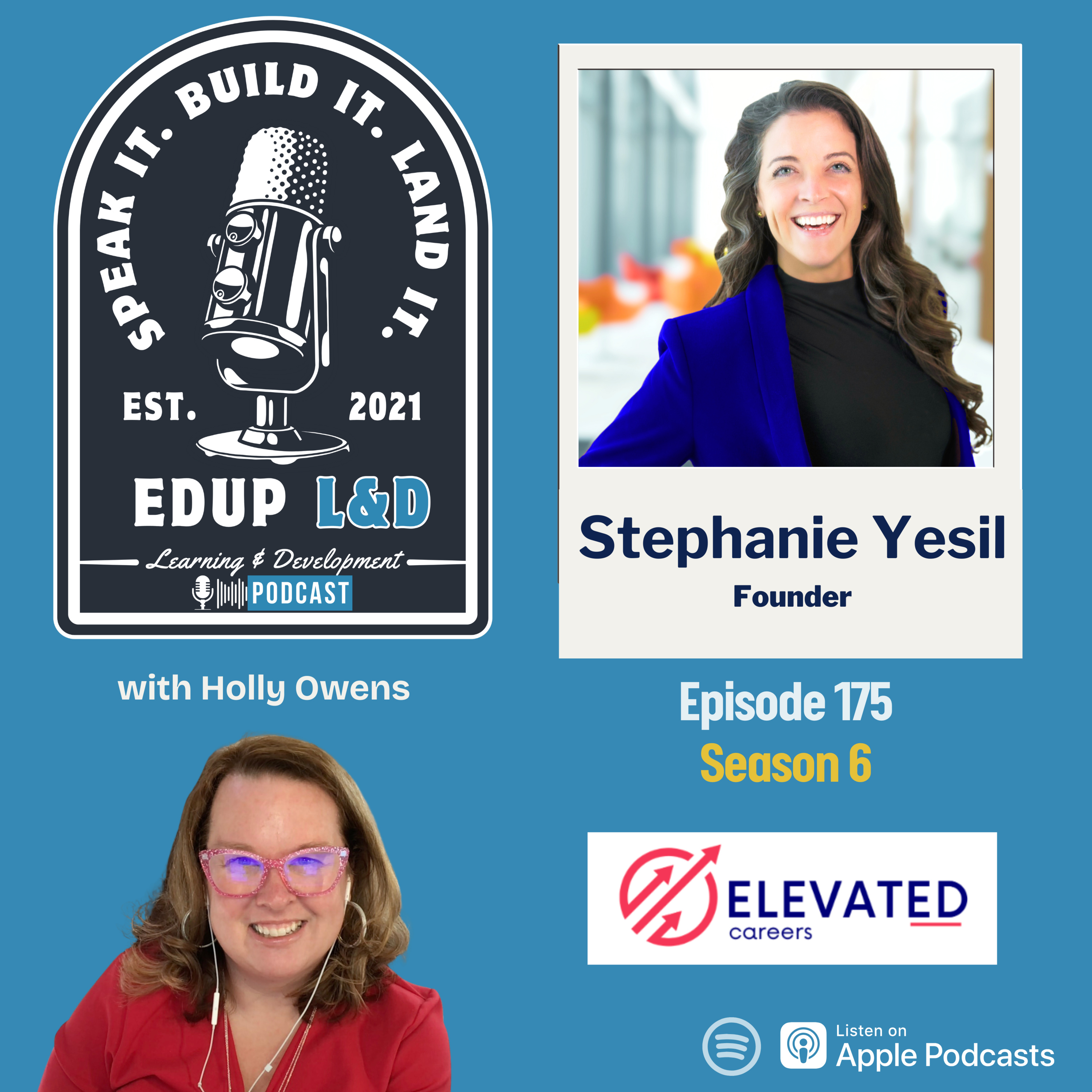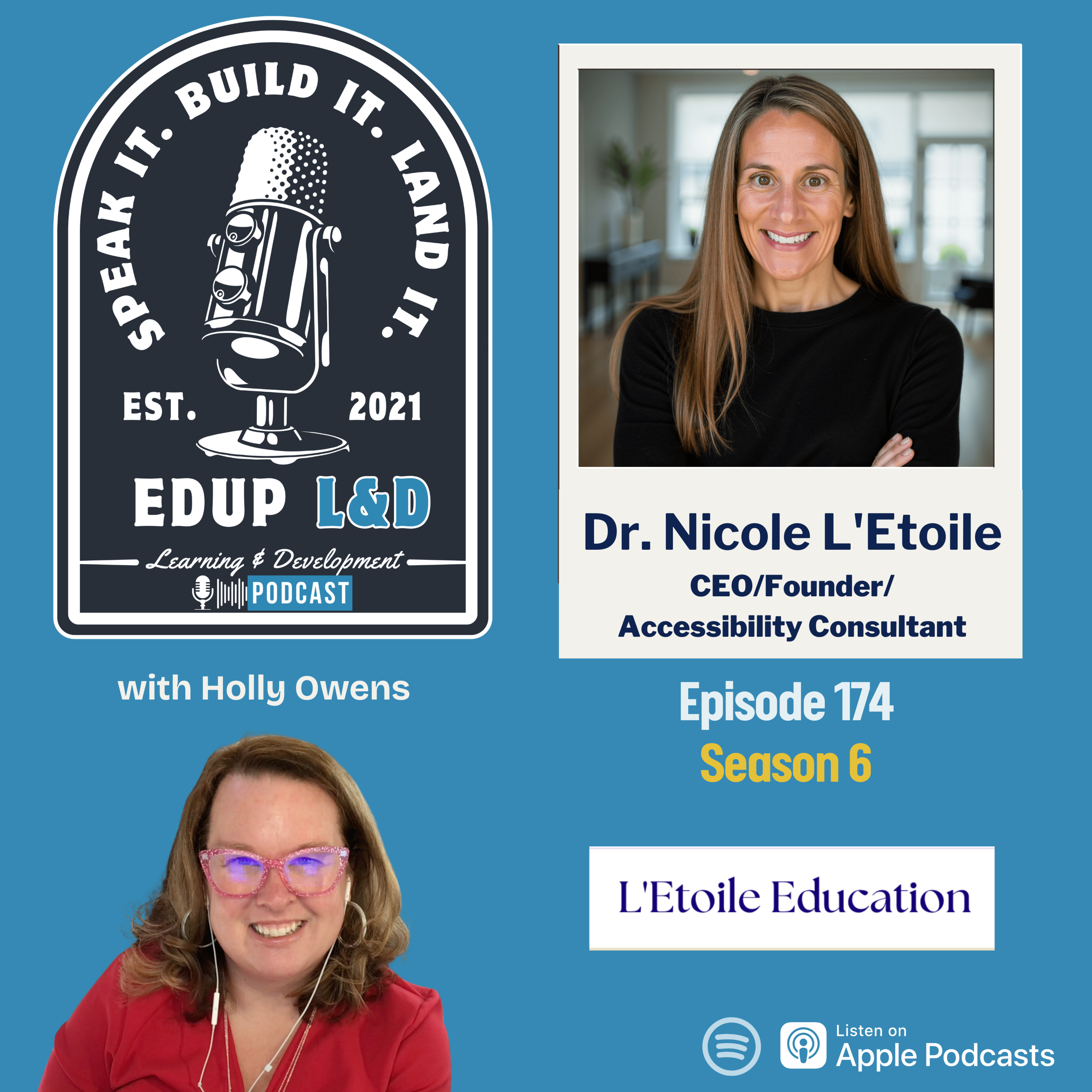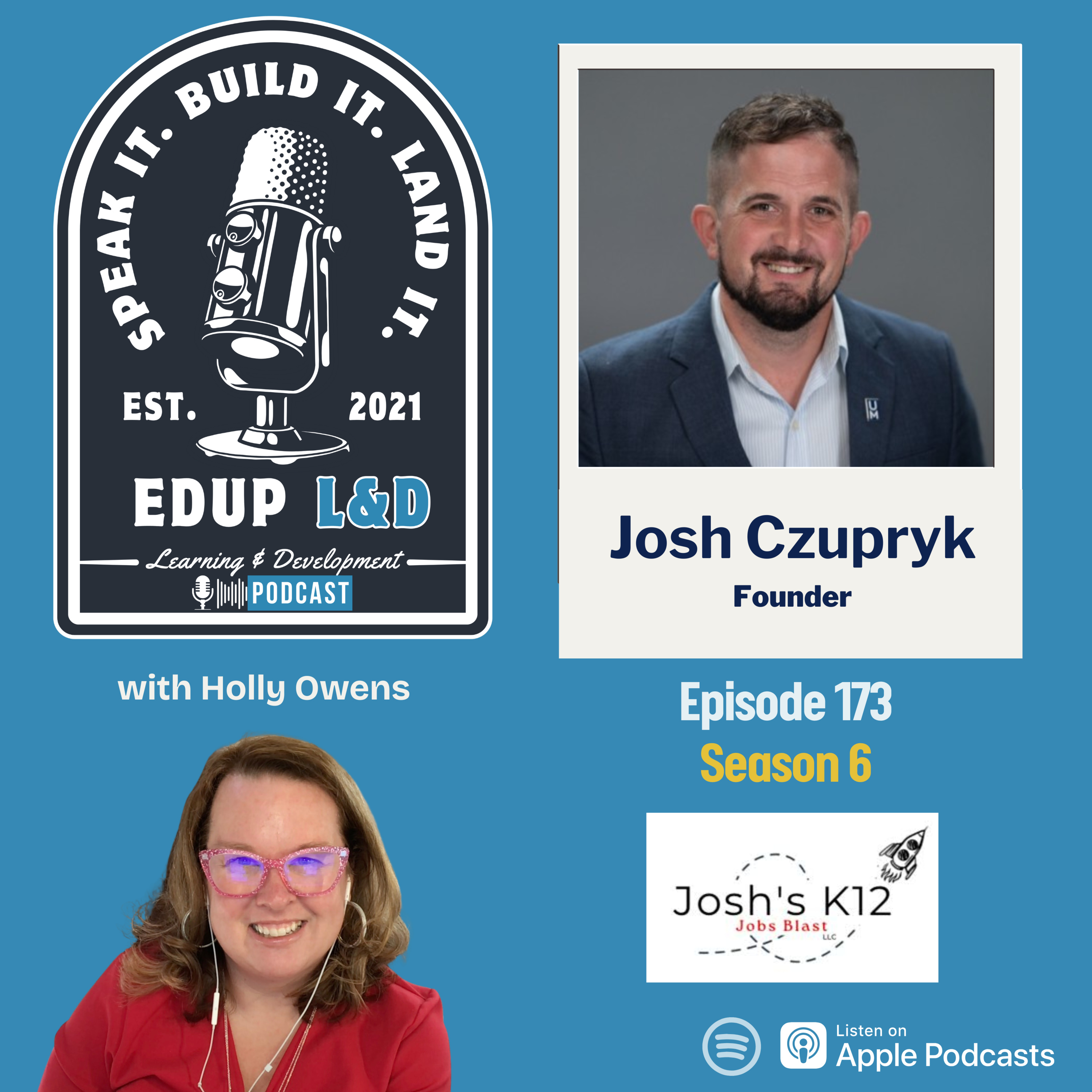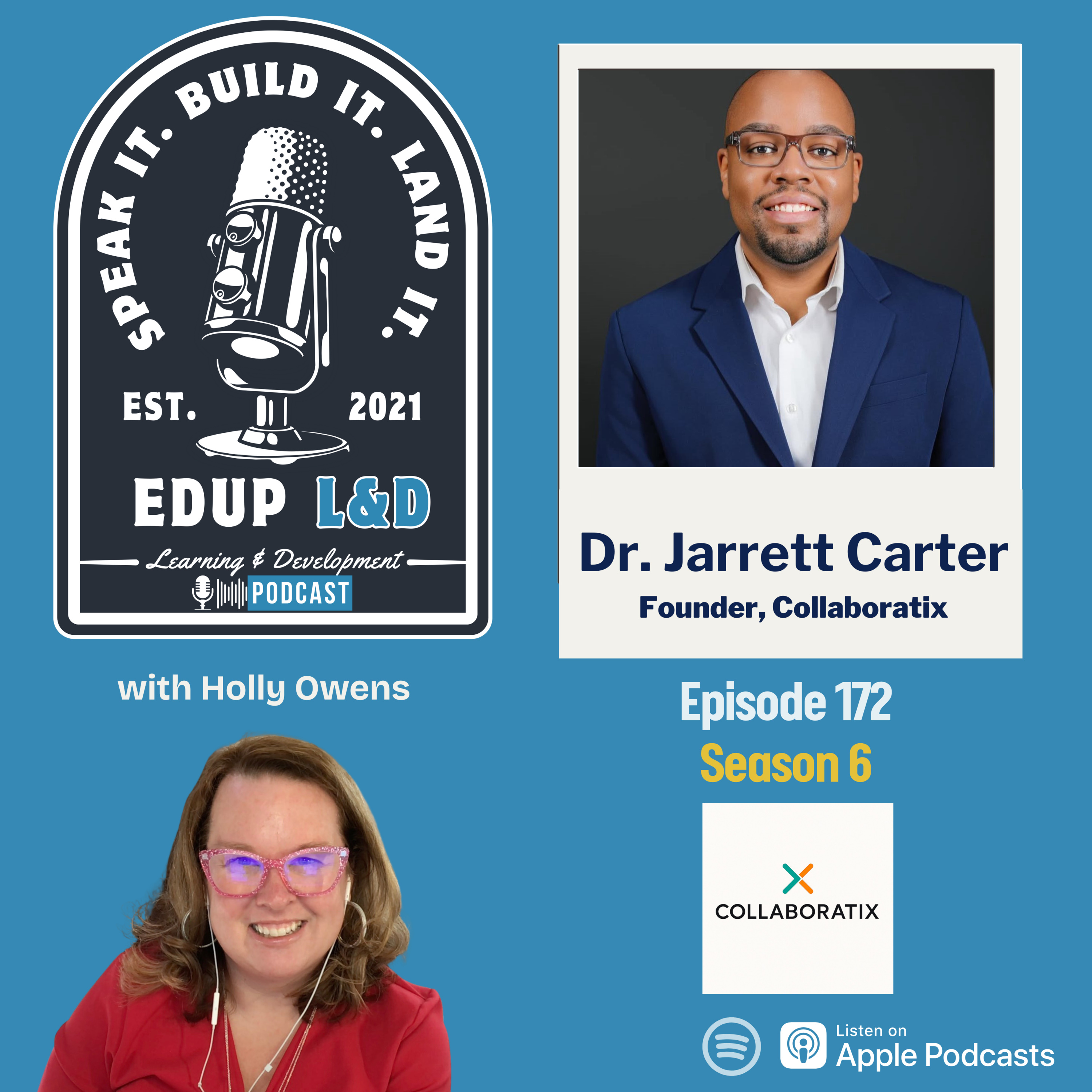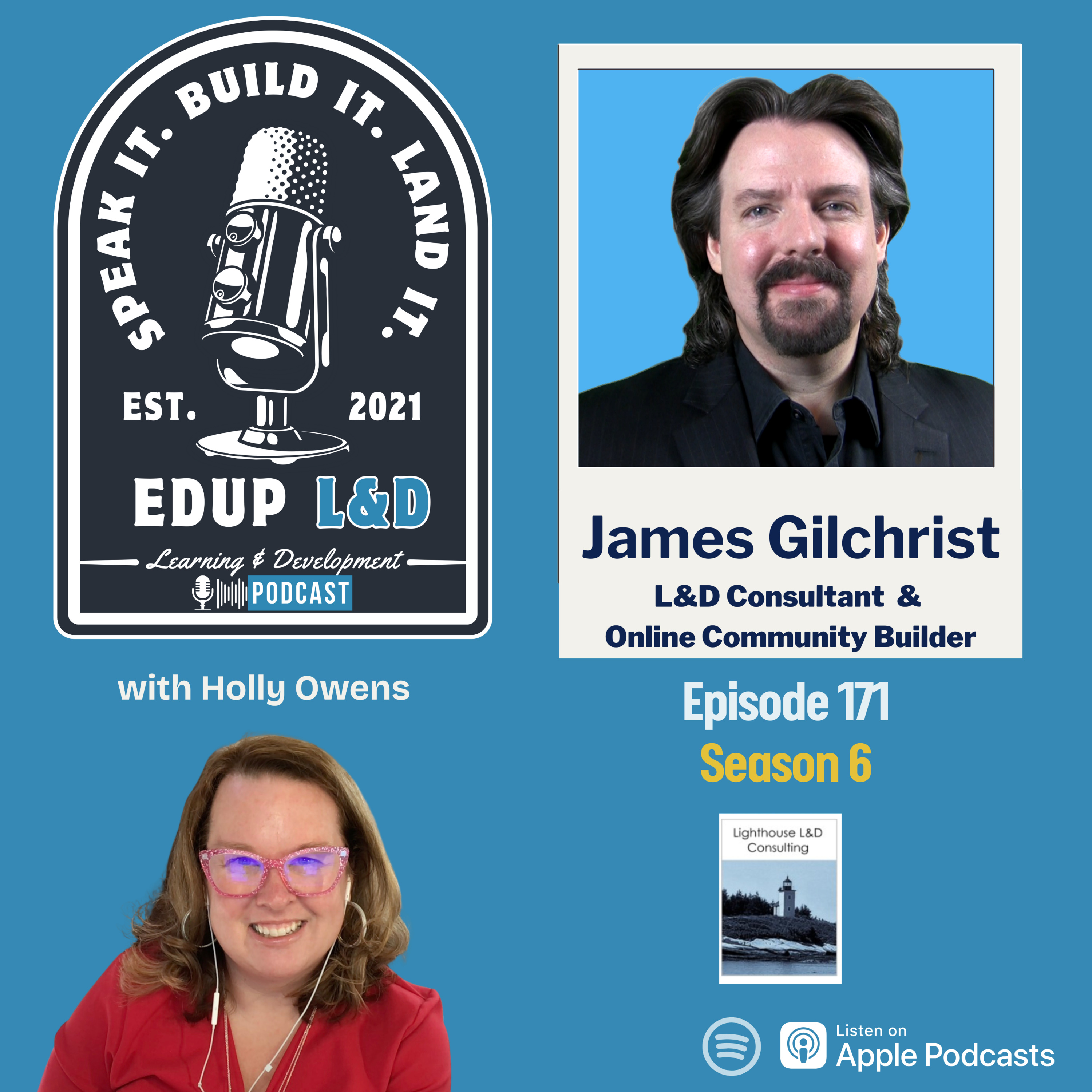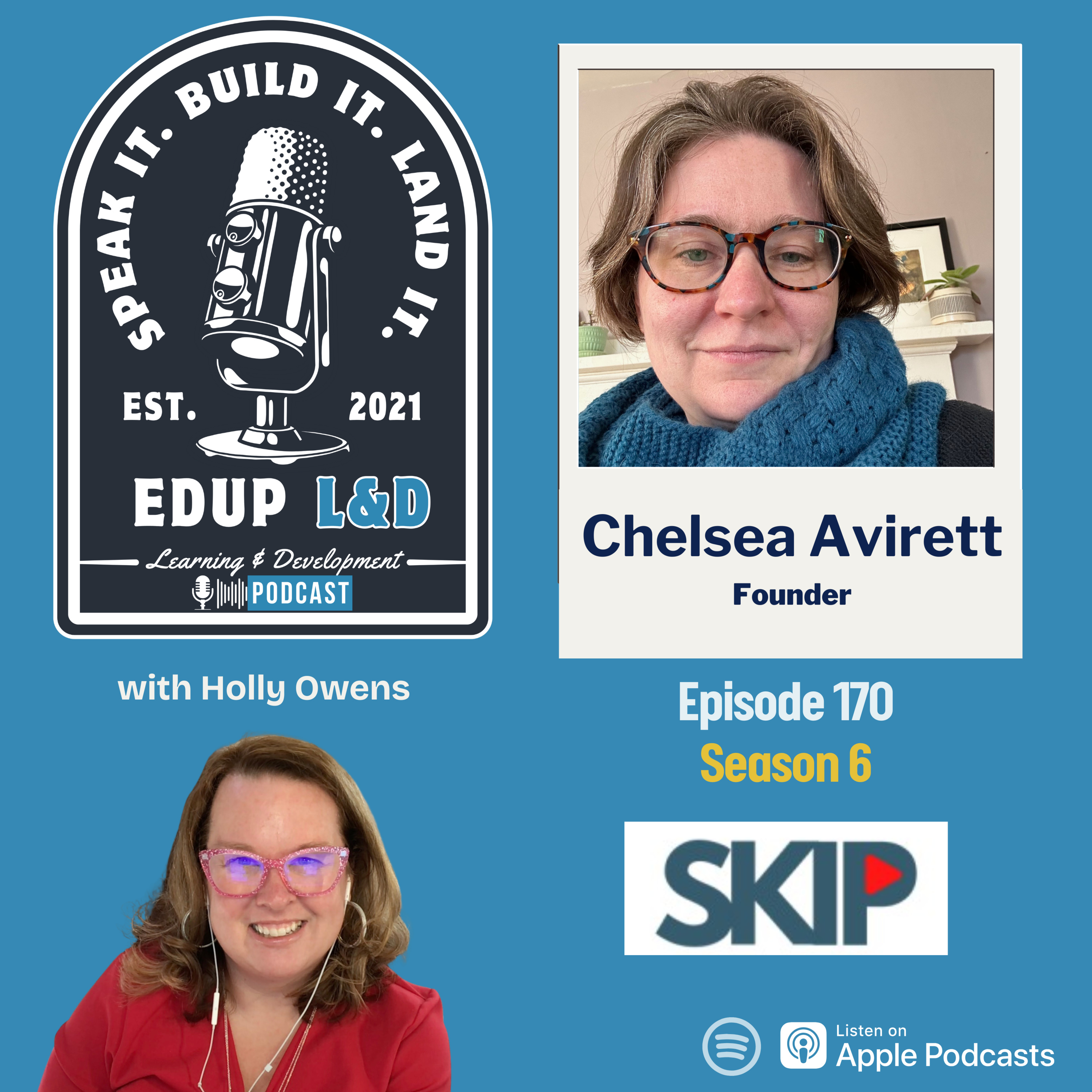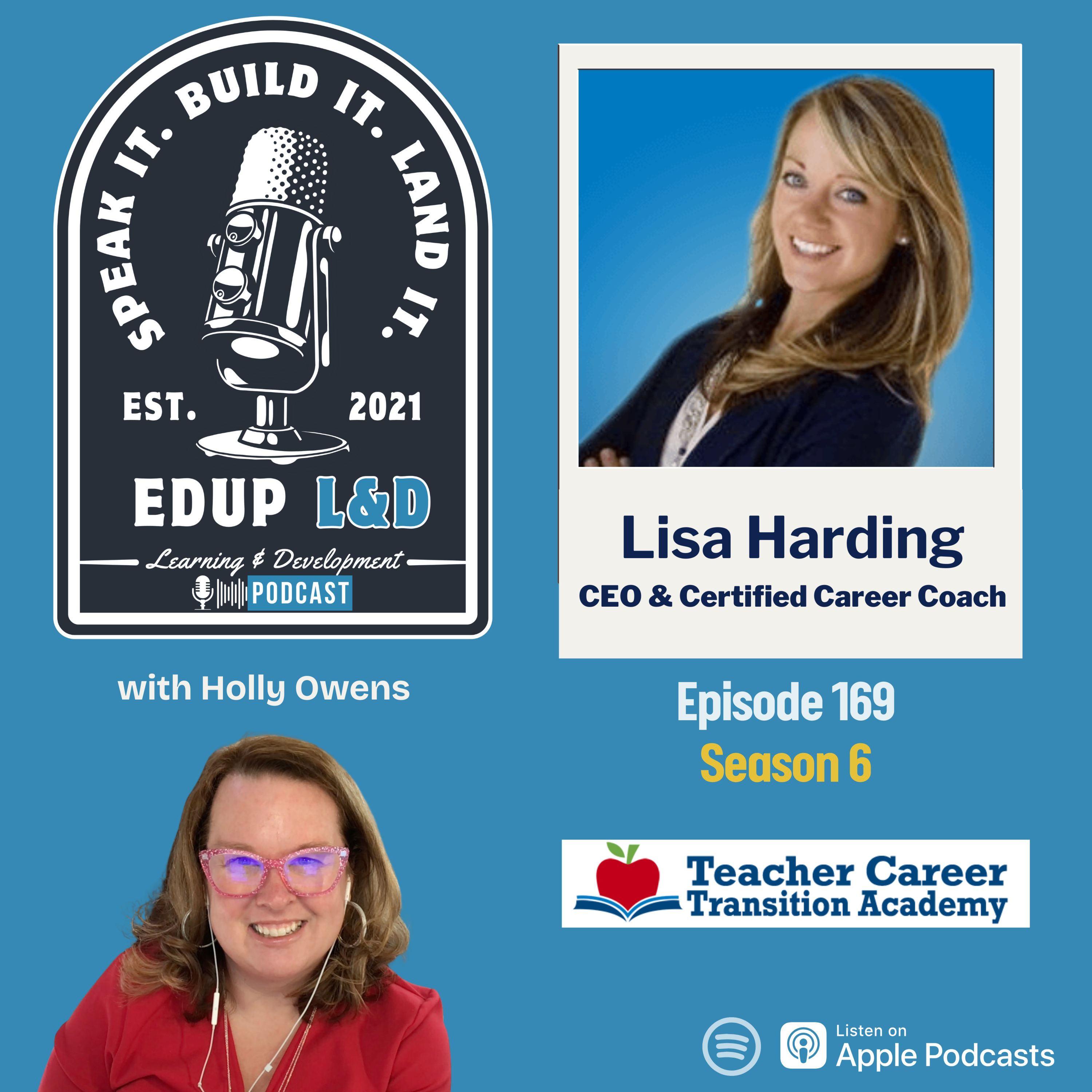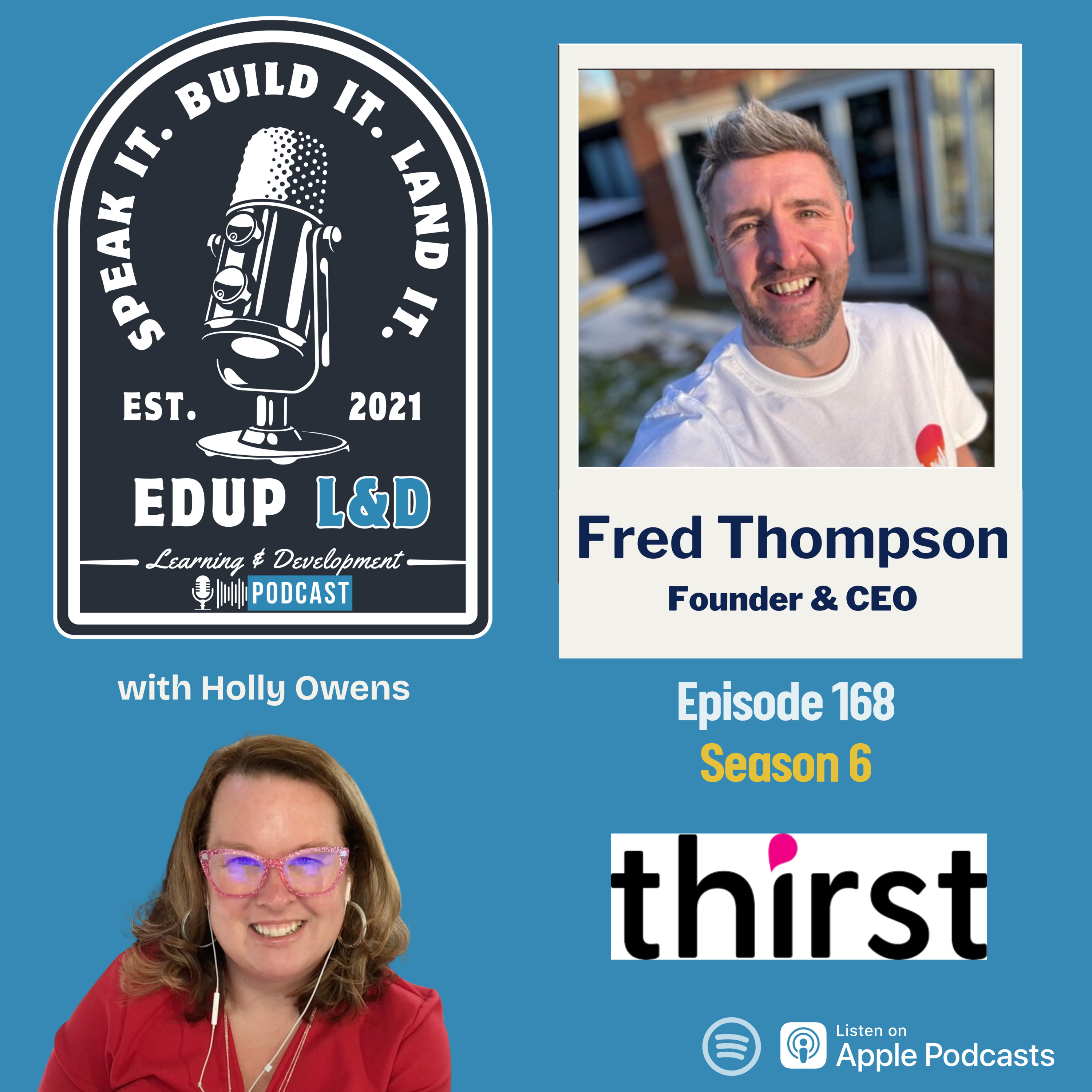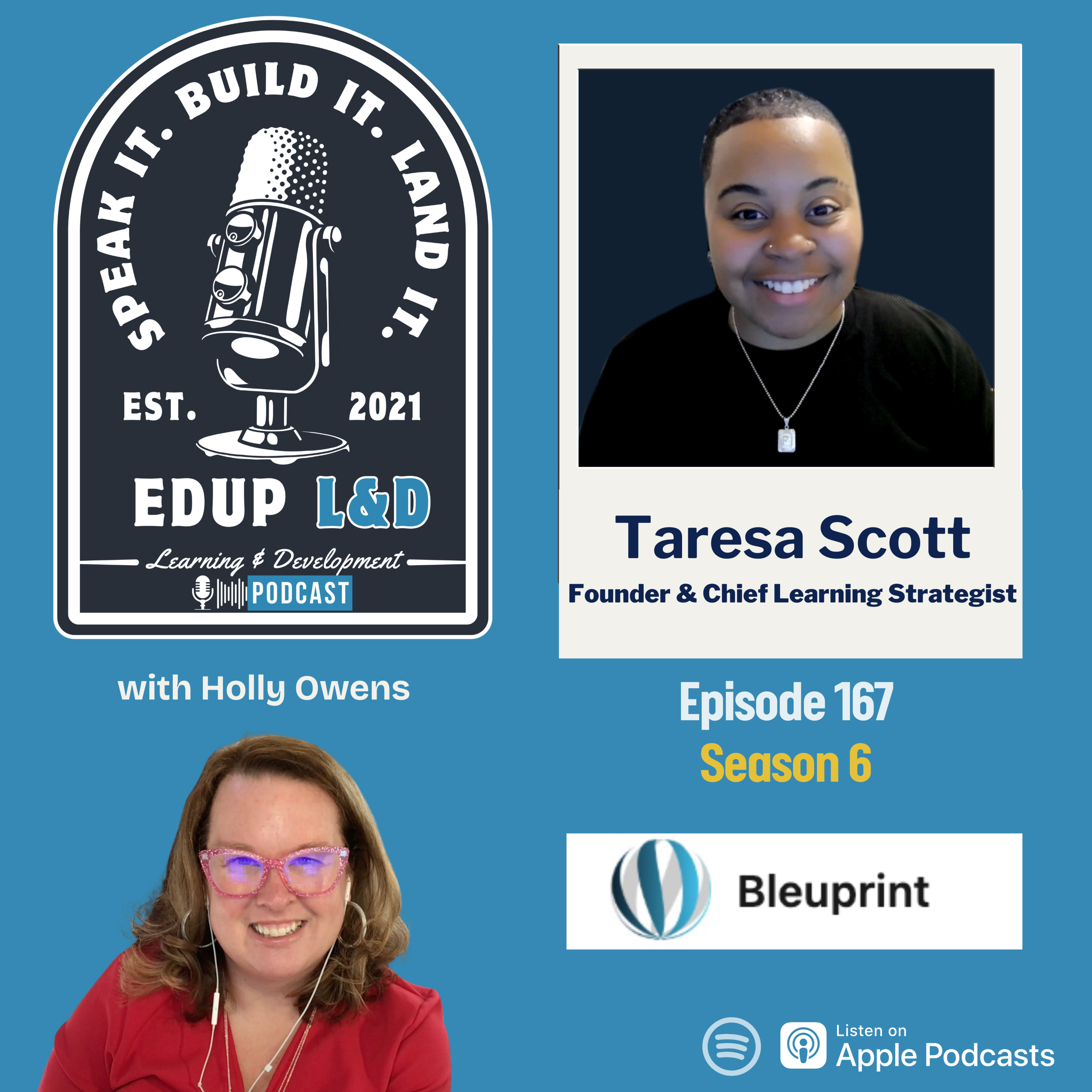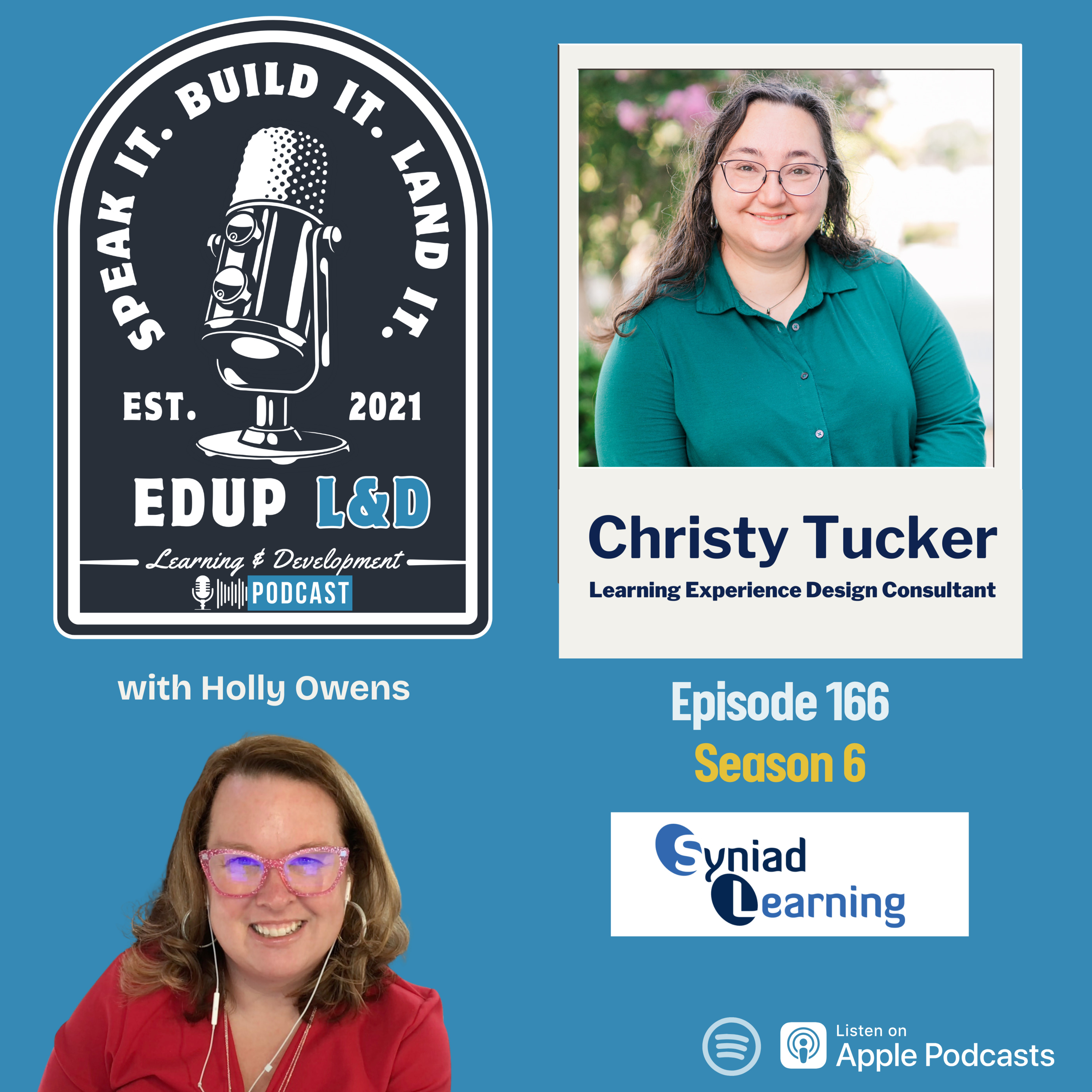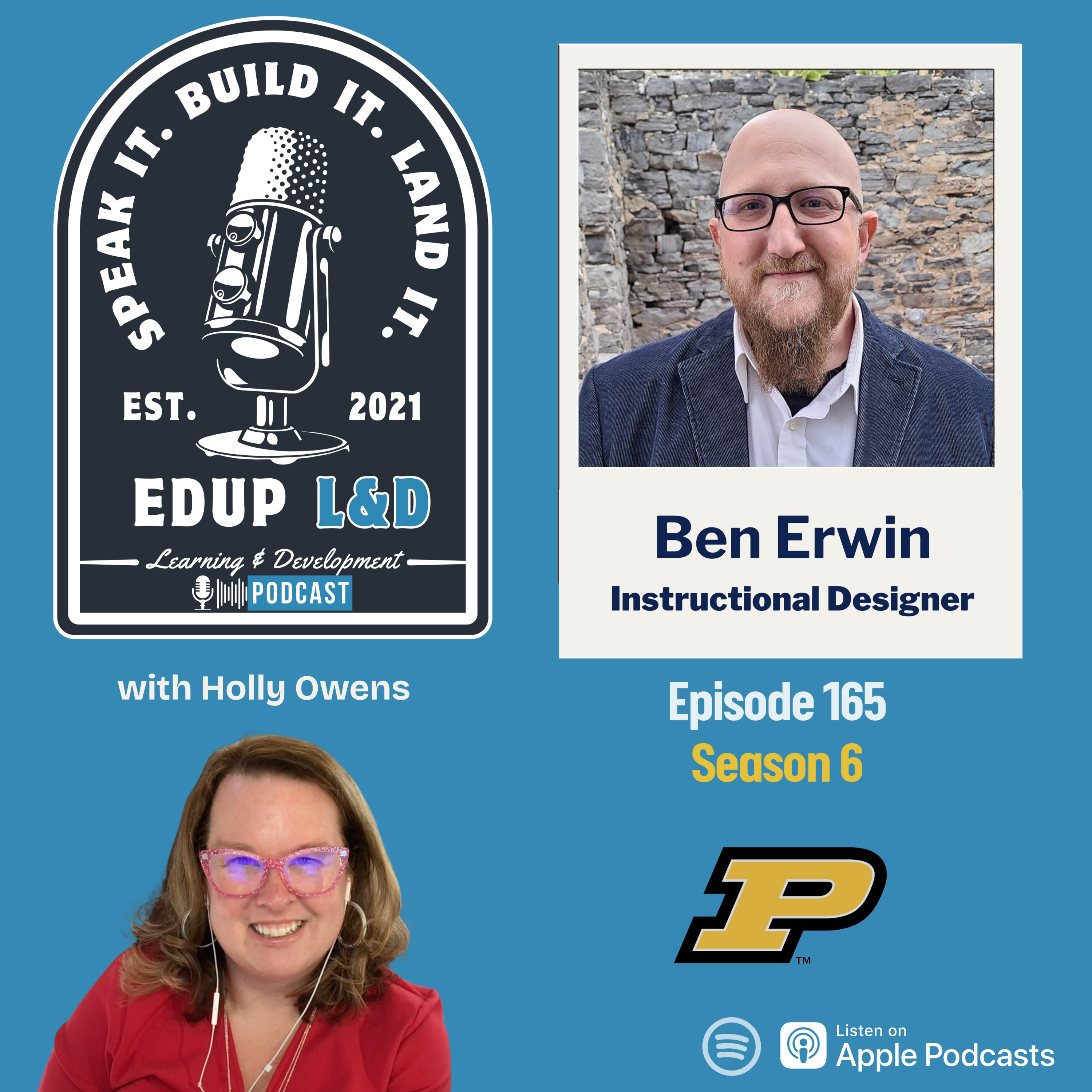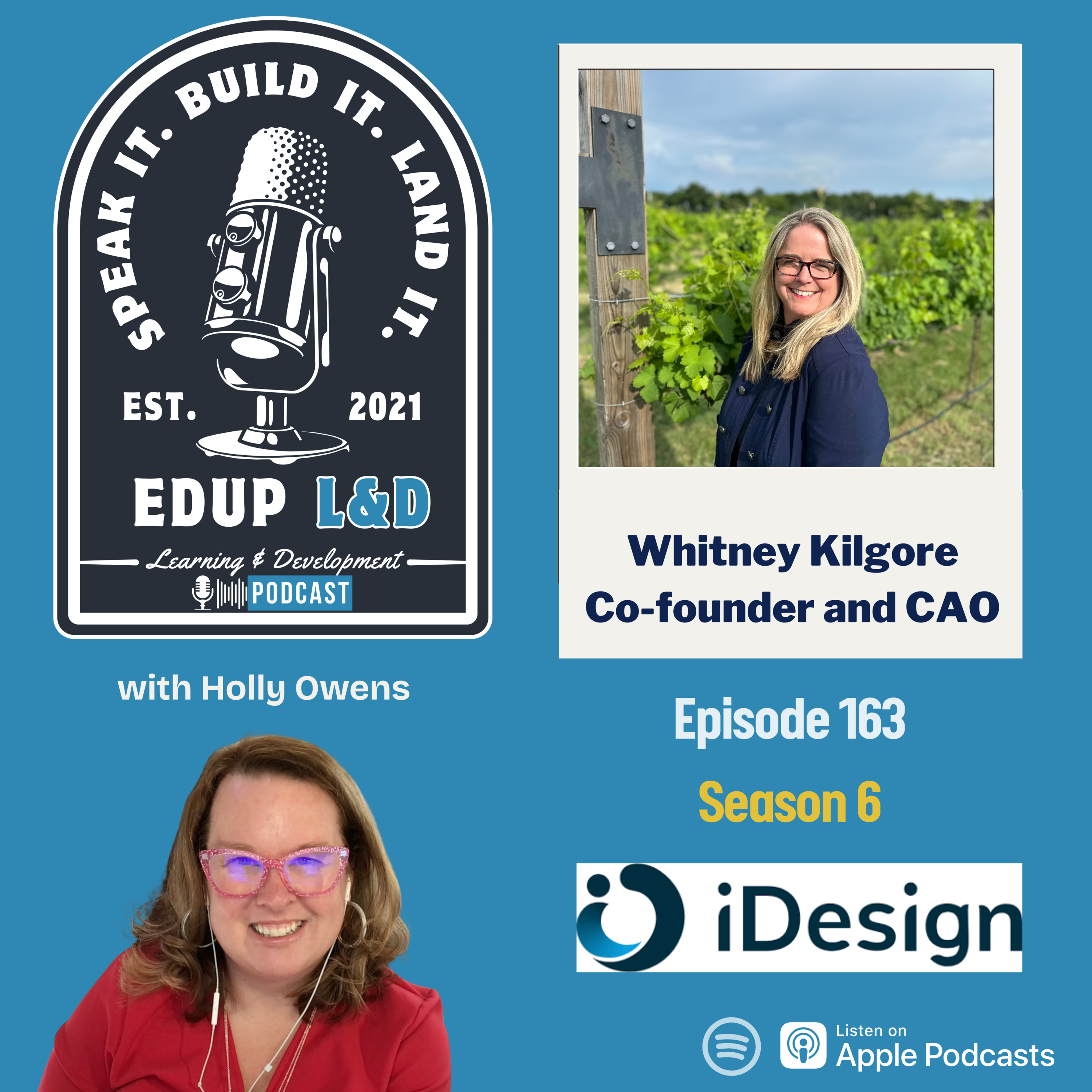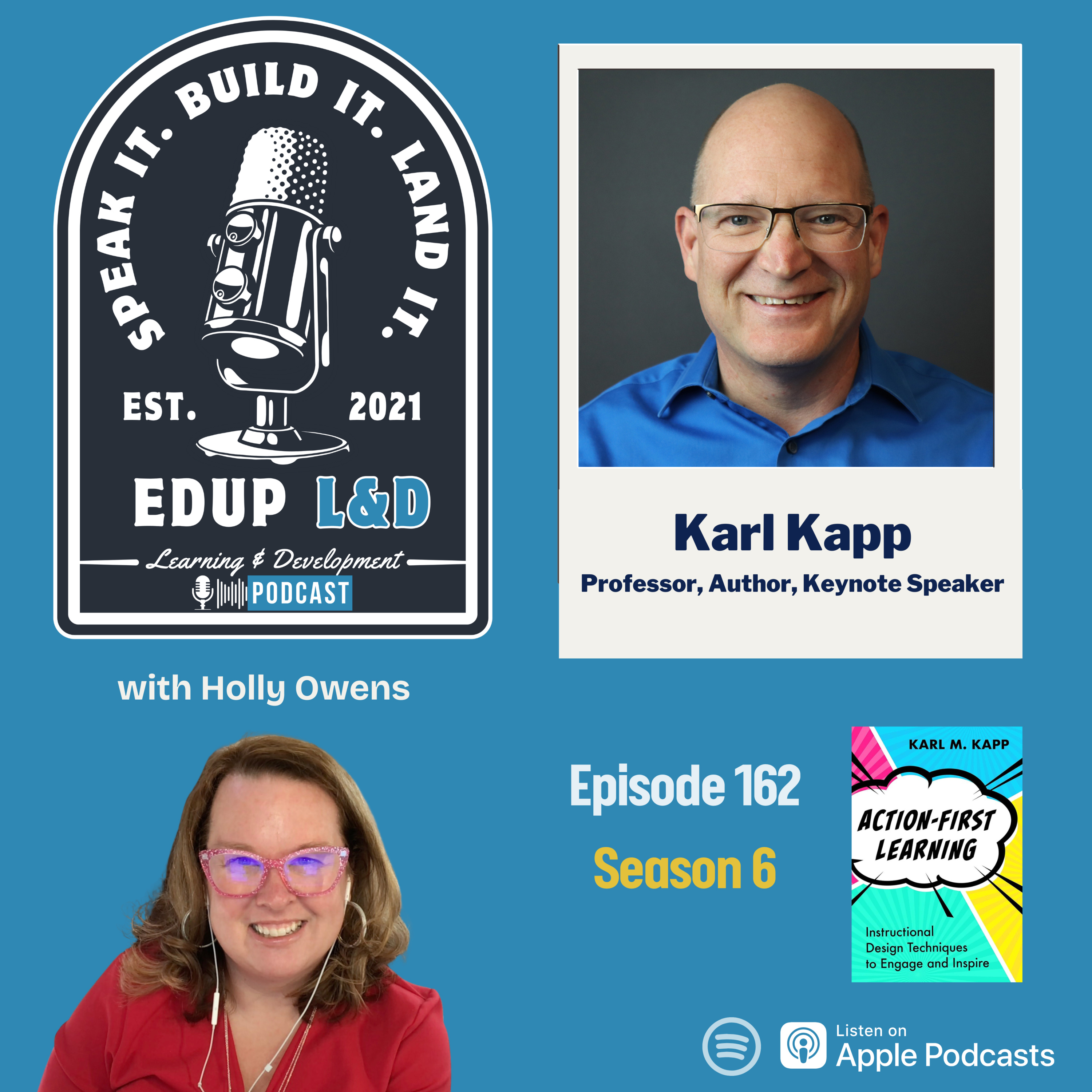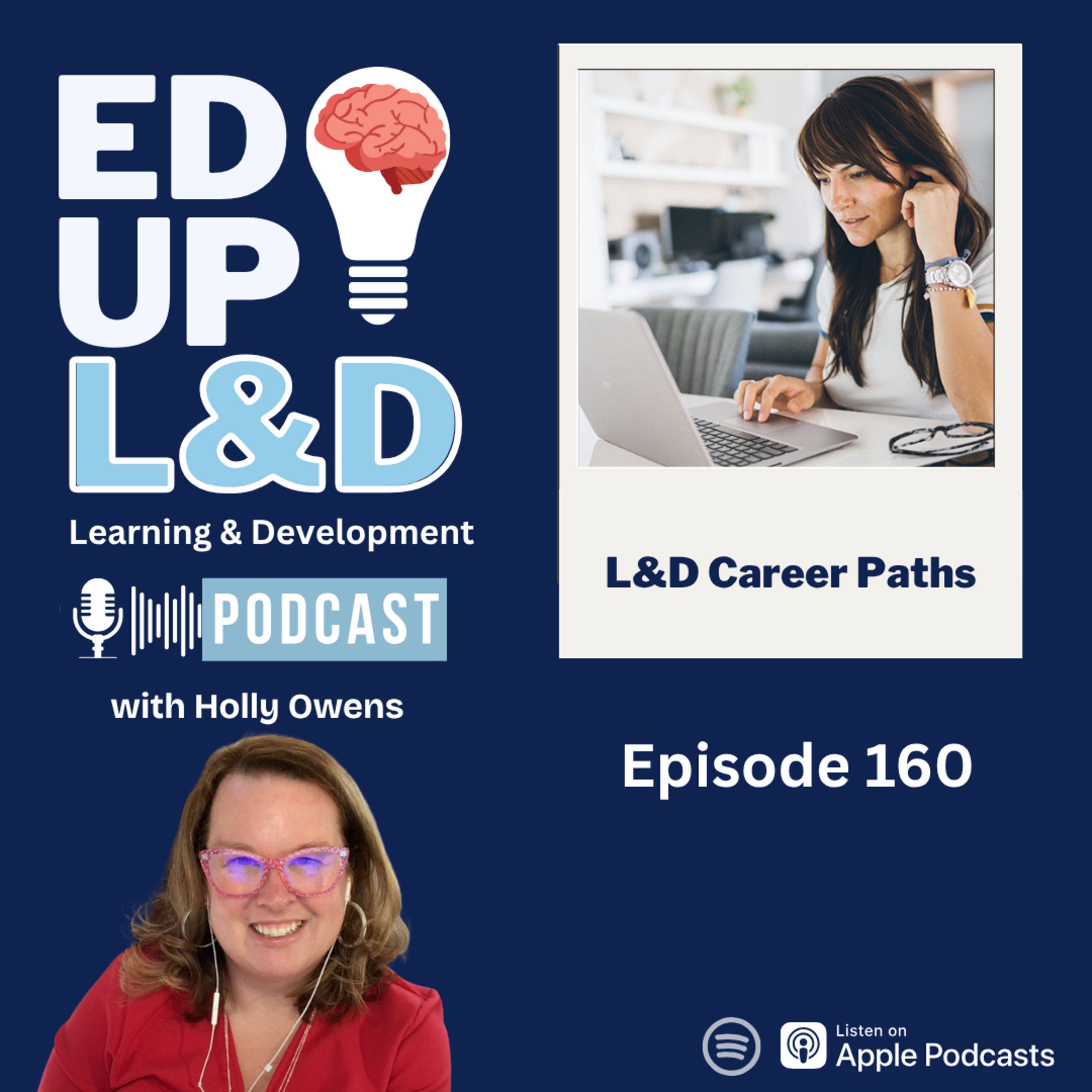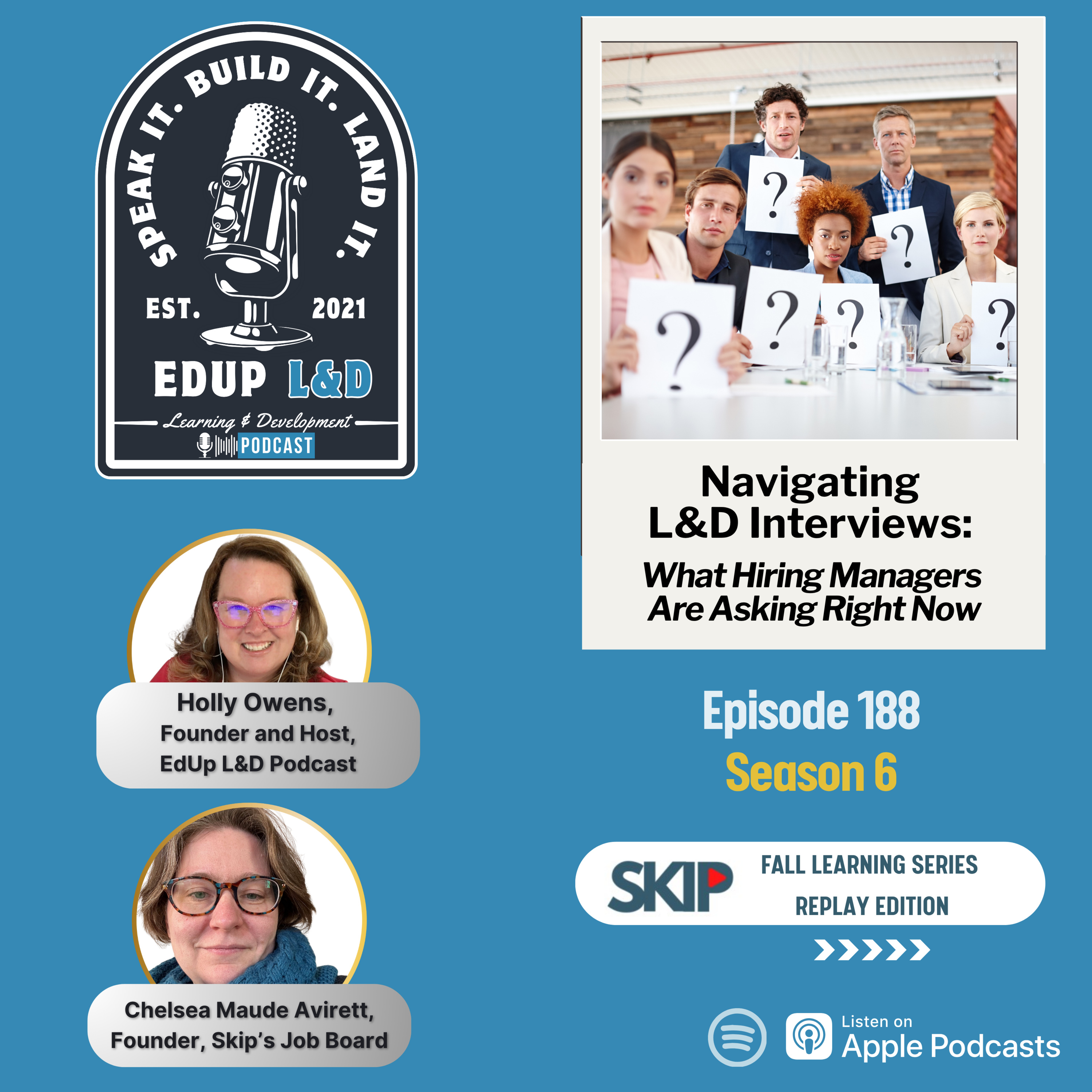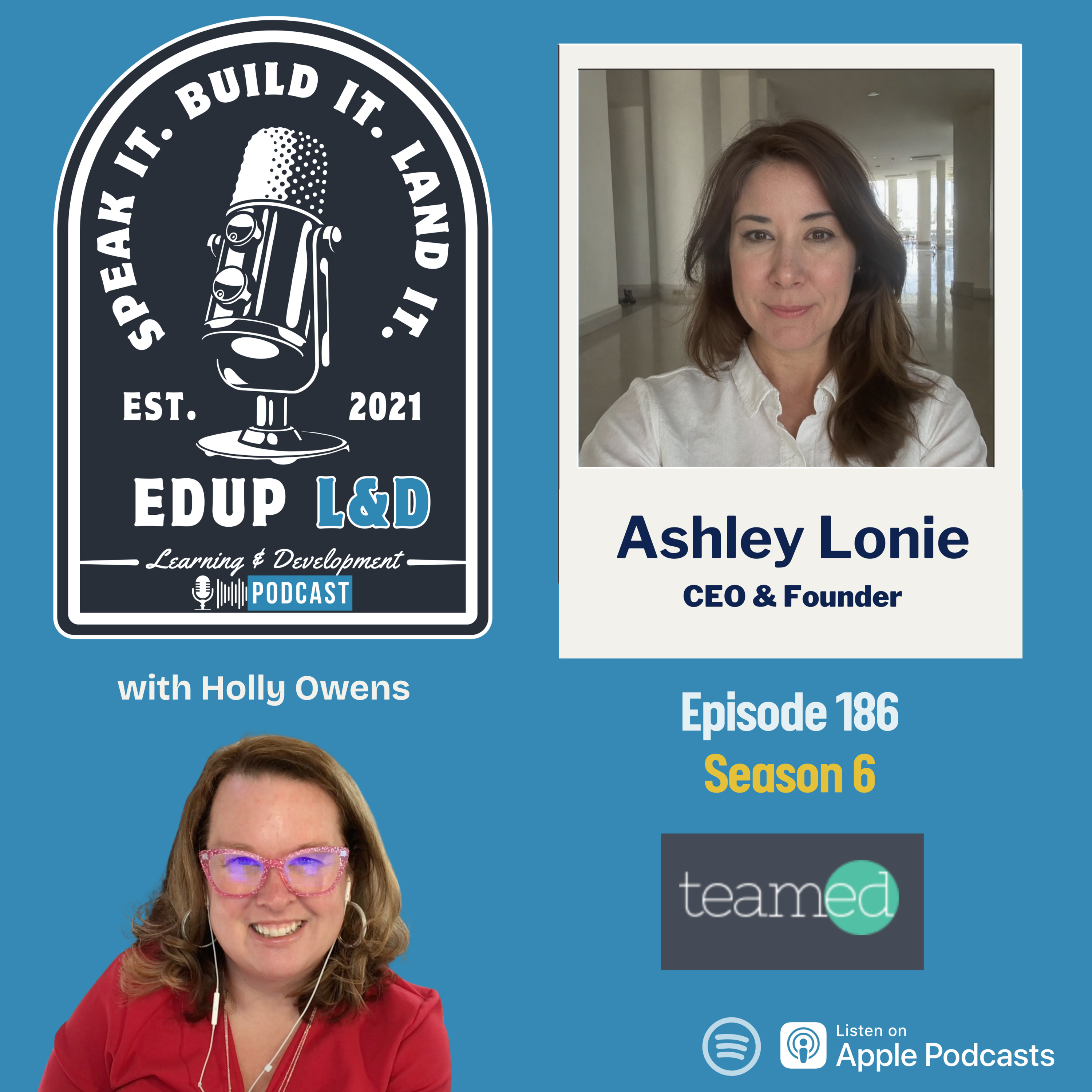
In this episode, Holly Owens interviews Ashley Lonie, CEO and founder of Teamed. They discuss Ashley's journey from being a teacher to leading a platform that connects professionals in learning and development with job opportunities. The conversation covers the importance of understanding career paths in L&D, the significance of bridge jobs, the dynamics of the job market, and how to leverage AI in job searches. They also emphasize the need for upskilling, building a strong portfolio, and the value of community connections in navigating the professional landscape.
In this episode, Holly Owens interviews Ashley Lonie, CEO and founder of Teamed. They discuss Ashley's journey from being a teacher to leading a platform that connects professionals in learning and development with job opportunities. The conversation covers the importance of understanding career paths in L&D, the significance of bridge jobs, the dynamics of the job market, and how to leverage AI in job searches. They also emphasize the need for upskilling, building a strong portfolio, and the value of community connections in navigating the professional landscape.
Resources Mentioned In This Episode:
Guest Contact Information:
Connect with Holly + Access Her Resources:
Grab your official EdUp L&D merch here:
___________________________________
Episode Sponsor: iSpring Solutions
🎙️ Huge thanks to our friends at iSpring Solutions for sponsoring this episode of the EdUp L&D podcast! 🙌
If you haven’t already, be sure to check out the iSpring Learning Exchange Community — a vibrant space for creators, educators, and L&D pros to connect and grow.
Grateful for the support and excited to see what our community creates 💡
Thanks for tuning in! 🎧
Holly Owens (00:00.77)
Hello everyone and welcome to another fantastic episode of EdUp L &D. I'm really excited. I have a first time guest and probably should be like a third or fourth time guest at this point. I have Ashley Lonie here and she is the CEO and founder of Team for Learning. So Ashley, welcome on in.
Ashley Lonie (00:20.064)
Thank you so much, Holly. I'm excited to be here. And yeah, I've just been, I've been watching all of the episodes and it's just a privilege. So thank you for inviting me.
Holly Owens (00:29.472)
Of course. Well, you know, we definitely like to talk for the listeners. We like to share resources that are great for them and Teamed is wonderful. I've been using it for a very long time and promoting it, of course. But before we get into that, we want to know a little bit about you since you've never been on the show. So how did you get to be this founder? You know, what were you doing before? Give us your story.
Ashley Lonie (00:53.012)
Well, I think like a lot of your listeners, well, maybe the majority of them, I started out as an educator. was a teacher in grades three and four and was really, I loved it, was really passionate about learning and how education changes economic mobility. But I was really interested in technology and how we could continue to evolve the system.
So I went out and I got a graduate certificate in instructional design and moved into instructional design roles, which was not necessarily easy. My first, really wanted to move into higher ed. I loved the idea of creating online courses there and...
Holly Owens (01:31.32)
No.
Ashley Lonie (01:39.828)
And let's see, so, but I couldn't find a job for a while in higher ed. So I pivoted into corporate learning and was doing training development for a military contract and eventually found a role at a university. I applied for the same job, I think three times. Every time they reposted it, I applied again and finally got in. Let's see. So then from there, I had a lot of great experiences, to make a lot of
Holly Owens (01:56.557)
Wow.
Ashley Lonie (02:08.918)
hires, work with incredible teams, innovate a lot. And it just, and I continue to look for more interesting opportunities and there wasn't a good place to do that. So I decided to go out and build it and learn how to do recruitment and staffing. And it's been really interesting. I've learned a lot of tips and tricks that, you know, that I hope to share.
Holly Owens (02:30.07)
Yeah, that's wonderful. We're looking forward to you sharing those tips and tricks. We have a very similar background. I think we've talked about this before because I went from high school teacher to e-learning developer in a government contract for about six months. And then I went to higher education when a role came open. And you know, it's like it is really challenging because, you know, I don't know, when did you leave the classroom?
Ashley Lonie (02:54.511)
gosh, it was probably 2008 maybe?
Holly Owens (02:58.942)
Okay, so there was these resources that everybody has access to now, you know, the free stuff, it didn't exist. You really were just trying to figure out your own path and like kind of hodgepodge and stuff together. And I found out about a job through my my current supervisor to time for the eLearning development. So it's like, it was you know who you know, and they put you on the path. So yeah, we're the we we left the classroom before it was cool to leave the classroom. There was no
transitioning teachers to none of that. So that's really cool that we have that commonality. So one of the things, I absolutely love Team I think it's a great platform. been using it for quite a bit and I'm always recommending it to people. But for the listeners who don't know what Team for Learning is, if you want to give an overview of that and how they can access it.
Ashley Lonie (03:53.335)
Sure, sure. So, Teamed is the idea behind it is to connect professionals in our field with organizations directly with hiring managers who are looking for that type of talent. So, in learning, so it's for people in corporate L &D, in higher ed, in publishing, in nonprofits, you know, across industries. And so it's at teamedforlearning.com.
And what we have is we have a job board that specifically publishes jobs in our field. We have a talent pool where you can go in and build a profile and join the talent pool. We also at Team do a lot of staffing and recruitment directly. And so if you go and you create an account and you drop in your resume, one of the things that we pride ourselves on doing is looking at the resumes in our resume bank because people come to Team, do we want to prioritize them first?
So we always look through those resumes first to see if we can find any matches and reach out to those individuals, schedule interviews. And so it's just, you know, it's a, it's really about a holistic approach to job searching. So it's about doing it proactively yourself, doing it, you know, without having to manage it every day through the talent pool, and then also having recruiters work on your behalf. They know you.
and pick you up as things become available. So, and the thing that we've recently added is alongside our job board is a career board, as you know, Holly, because you actually, I think you inspired this a little bit. you really did. Yeah, because we saw the great resources you were posting on your Google Doc, and we're like, you know what, this is what people need access to.
Holly Owens (05:29.278)
wow.
Ashley Lonie (05:42.123)
They need to know how do I upskill? How do I transition? How do I land that next job? And so we created a career board with all of those resources. So with degree programs, certificate programs, webinars, books, coaches, you know, the whole thing.
Holly Owens (05:54.701)
Love it.
Holly Owens (05:59.769)
my goodness. And you know, I started creating that because I just was going everywhere all the time to look for different things. And I was like, I really need an all in one stop shop. just, you know, I can't, I can't organize my brain with all these bookmarks and things trying to figure out where to start. And, know, definitely since we did, we did transition out before it was cool and we didn't have these resources. I want people to feel like they're more organized and team does, team does that.
I love the fact that it's free to create your account, make yourself available, say what you're looking for. You can set up job alerts from your job board. People, you're not paying for this. It's not something that's a paid for subscription and it's right there. And you're able to market yourself for things that you want to land into. And I just love that.
Ashley Lonie (06:30.09)
Mm-hmm.
Ashley Lonie (06:52.832)
Thank you so much. Yeah. Well, we think it's really important to have free resources out there for professionals. You shouldn't have to pay to find your next job. Although there is the exception of coaching. Coaching can be incredibly helpful, that one-on-one personalization. And so there is that difference.
Holly Owens (07:07.82)
Yeah.
Holly Owens (07:14.934)
Yeah, absolutely. And I think that if people are figuring out where to start, I would definitely encourage them to go to Teams first. So they get an idea of what they're dealing with. And also, a lot of people that come to me or inbox messages I get on LinkedIn, they're like, well, where do I start? And I'm like, well, where do you want to be? Because L &D is so vast. Do you want to talk a little bit about that? People always say, where do I start? Where do we start, actually? Where do we start?
Ashley Lonie (07:34.699)
Yes.
Ashley Lonie (07:43.529)
You know, I think you and I have been through this so many times and had so many conversations. And it's actually the conversation I have to when I'm interviewing folks is, well, at the end, what are your aspirations? Where are you headed? What can we keep an eye out for? And so it's really important to start backwards. Where are you?
Holly Owens (08:03.064)
Backward design instructional designers.
Ashley Lonie (08:06.546)
What are you passionate about? What are you good at? How do you like to spend your work time? So do you like to be collaborating and speaking and training? Do you like to be designing? Do you like to be managing? And I really, think that sometimes people in our field, particularly people who are just transitioning into the field, are thinking about it too narrowly. There's a lot of different opportunities. I know myself, and it sounds like you too,
Holly Owens (08:29.357)
Yeah.
Ashley Lonie (08:34.43)
We were both really focused on getting back into education and instructional design. Right? know there was a lot of comfort in it, but I think that people should get uncomfortable sooner and really be open to, to roles across the fields and think about their economic situation. There is a big pay disparity between, education and, and corporate learning.
Holly Owens (08:37.634)
Yep. I wanted to feel comfortable. Like I was not ready for corporate at that time.
Holly Owens (09:04.023)
Yep.
Ashley Lonie (09:04.082)
And so, and it makes a difference. So, you know, do what you are passionate about, but really think about that and think about different titles other than just instructional design. There's customer education. There is, you know, there's a lot of operations roles. There's project management roles. There's technology, there's design, there's marketing, as you know. And so there's a lot of different ways you can engage in learning in various types of roles. So think about what you're really good at, what you love.
Holly Owens (09:25.387)
Yeah.
Ashley Lonie (09:33.814)
and maybe try to specialize in something and be open to
Holly Owens (09:38.927)
Yeah, it's interesting when I have conversations with people and they're like, you know, I want to be an instructional designer. And I'm like, okay, so tell me about some of the skills, like some of the things you like doing. And they, started telling me like, well, I really like using the technology. I like developing the courses. And I'm like, you know, you sound more like an e-learning developer to me than, an instructional designer. Or if they tell me that they really like managing the program and like, you know, putting the curriculum together. I'm like, you're like, that's more of a program manager. So.
Ashley Lonie (10:06.091)
Yes.
Holly Owens (10:06.484)
Again, what you're saying, you really have to figure out, like, you know, it might be instructional design, but it might be something else that's like adjacent to instructional design that's going to fit your skill set and what you're actually looking for.
Ashley Lonie (10:19.19)
Absolutely, and if you don't know yet, then apply to a few different types and really look at those job descriptions and say, this something that I could see myself doing? And you never know where it'll take you. So if you don't know, don't be afraid to apply to different opportunities.
Holly Owens (10:34.434)
Yeah.
Holly Owens (10:39.2)
Yeah, absolutely. think one of the things, you know, I talk about with other people is like a bridge job. Like you're bridging yourself into learning and development and you the first role that you get is not going to be necessarily your last role in L &D, but it's going to be like a bridge to the next role. So don't like, you know, criticize yourself or feel like I'm just I'm just taking this role. Obviously, we don't want you to take a role that you don't like or is going to be toxic or things like that. And there's ways to avoid that.
Ashley Lonie (10:46.517)
Yeah.
Holly Owens (11:08.844)
But the bridge jobs are really important because number one, it gets you experience. Number two, you get a better understanding of how internal processes work within an L and D group or within a particular corporation, whether that's small or big or an institution. So it really is a great stepping stone.
Ashley Lonie (11:27.816)
You know, and I'm so glad that you said that because it's, you really have to start somewhere. There's like, there's two, there's two really important points about, about bridge jobs and transitioning. And I think one that closely relates to what you're talking about is, is I just placed someone who had 20 years of publishing experience, and was an editor and she was passionate about moving into higher education and was trying to figure out how to do that and move into instructional design.
And so she ended up taking this bridge role that is an instructional designer role with a publishing company. And it pays a little bit less, but it gives her that experience. It's a short-term contract. And then she'll be able to be more likely to be considered for that next higher education role that she's applying to. The other thing that we see all the time, and you must see this too, is that teachers
Holly Owens (12:18.455)
Yeah.
Ashley Lonie (12:26.12)
often have been in the classroom for a long time and they're at a certain salary pay schedule and they anticipate or expect to be at that same pay rate as they transition over or even higher. And this is where the gap is that the employers see them as new to instructional design, even though they're bringing over all these great transferable skills, there's still some things to learn.
Holly Owens (12:47.33)
Yeah.
Ashley Lonie (12:53.238)
So it's important to be a little bit flexible on salary for one to two years, and then you ramp up really quickly and then can command the top tier of the salaries. Because you are, you're a mature professional who's already been working, but it does, there is a little bit of back before you go forward.
Holly Owens (13:05.037)
Yeah.
Right?
Holly Owens (13:13.602)
Yeah, I say don't discredit that experience because I think some people are like, I'm not even going to put my teaching experience on there. I'm like, why? Why are you not going to do that? That seems counterproductive to me. And yeah, there are some times where you might just have to take a little bit of a pick up. But also, too, when you're interviewing for roles and you're asking about salary ranges, one of the things I say to ask for is like, what are the opportunities here to grow?
because you don't know within those one to two years of that company, could be, you can start out as an instructional designer, but then you can be a senior ID or then you can be a manager. So there might be a whole path for you there in which you are making at a certain point more than you may teaching. think Tim Slate put it out email today about you think you're going to be making double what you make in teaching. Cause I think some people put that out there. And I think that's falsified advertising because it's not always the case.
because like you're saying, some people see you as entry level into this field. You're probably entry to mid at most roles, but I think it's important to be realistic about your expectations.
Ashley Lonie (14:15.338)
Yep.
Ashley Lonie (14:20.304)
I agree. I agree. You're going to make more than a brand new graduate, but you're not going to make as much as somebody else with 15 years of experience in an ID.
Holly Owens (14:30.214)
Right. And it's not like we don't hold these positions because we're making millions of dollars. Right. There's something about this position to where the passion that we had for education is still fulfilled in these roles. So that's why we do it. So again, know, anything in the education space, especially higher ed, know, K to 12, notoriously lower salaries than say something in a corporate environment like an Amazon or a Microsoft.
Ashley Lonie (14:36.822)
Right. Right.
Ashley Lonie (14:58.038)
Yes, yes. And you might be really satisfied in one of those positions too. It might be very rewarding. There's a lot of, there's a different type of autonomy in that than in higher ed. And so I think as you know, Holly, there's different cultural differences in industries and it's important to look at that too, of what fits you rather than just what are you comfortable with at the moment.
Holly Owens (15:16.845)
Yep.
Holly Owens (15:25.248)
Absolutely. And one of the things that people are saying, there's some noise out there about this job market is competitive. I believe it's competitive. It really is. How do you feel about it? Do you think it's competitive? Do you think it's saturated learning development? What's going on? People are worried. I'm sure listeners right now are like, I don't even know if I want to start this because there's so many people out there applying for roles. And you know, the whole thing with LinkedIn, when LinkedIn started.
Ashley Lonie (15:31.424)
Hmm.
Ashley Lonie (15:39.712)
Hmm.
Ashley Lonie (15:45.312)
Yes.
Holly Owens (15:53.407)
Showing you how many people have clicked or applied or whatever they did it kind of scared people a bit You know, like I don't think I'm gonna get this so they were deterred from applying
Ashley Lonie (16:03.286)
So I was hoping that question would come up because the job market right now has been really, it's been a little bit turbulent. There has been starts and stops. And so we have seen weeks to a month and a half of really strong, you know, employment trends to it falling off of a cliff. And, you know, and I don't say that to scare anyone.
Holly Owens (16:19.15)
you
Ashley Lonie (16:31.296)
But the pendulum is always shifting in one direction from the other. There was incredibly high hiring during the pandemic, and then it dropped off and we saw it starting to rise again. And now with AI and productivity, there's just like, there's a pause on the corporate hiring side. We're seeing universities, a lot of university roles at the moment. We're seeing more contract roles at the moment as well.
Holly Owens (16:55.948)
Yeah, I was going to mention that. Tons of contract stuff.
Ashley Lonie (16:59.626)
There is, there is. And, and yes, it's really competitive. so that's why it's so important to do your work on the front end of creating a great resume, having a portfolio, make sure you're upskilling so that you have some sort of credential. but it's not impossible. People are applying for, you know, and I know this sounds terrible, but people need to apply to.
hundreds of positions possibly. So I would say do not be discouraged and plan to apply to at least a hundred positions if not more. So it is. is. And that's, but that's if you're running a remote role. If you're looking for something in person, there's a lot less competition. So there's, you know.
Holly Owens (17:38.52)
Yeah, that's how competitive it is right now.
Holly Owens (17:49.453)
Yes.
Yeah, people at remote is definitely, if you can find something hybrid in your area, don't rule out hybrid either. I think that's one where there's less competition as well. And just think about, one of the things I like to think about is like the companies are places I wanna work. And I go and I explore their websites to see what's out there. Like what are they currently doing? Look at their careers page or see what they offer.
Ashley Lonie (17:57.771)
Hmm? Yes.
Yeah.
Ashley Lonie (18:10.335)
Okay.
Holly Owens (18:19.736)
Go to the team job board, see what's happening there. I think before you start jumping into applying for these jobs, there definitely is some research you have to do figuring it out like, like this about this role, I don't like this about this role, or I could compromise and deal with this for a little bit, or things like that. think people automatically think that the first thing you should start doing is just apply, and that you're not prepared yet.
Ashley Lonie (18:30.87)
Hey.
Ashley Lonie (18:45.109)
Yeah.
I agree. I think there's definitely some research. But once you've been applying for a while, you have a sense of the landscape and the different types of opportunities. You do. And then it doesn't take as long. But people should really be using AI too. Not to do everything for them, but as a partner in the application process, because it's exhausting. It takes a lot of work.
Holly Owens (18:56.116)
Mm-hmm. You learn stuff like throsmosis. Yeah.
Holly Owens (19:07.662)
Hmm.
Ashley Lonie (19:17.462)
And whatever you can do to not feel as overwhelmed and to not take up as much of your precious time than necessary, it's really, really important. And it's also going to teach you how to job match in terms of how do, what vocabulary am I using? What percentage match am I to this job? Is it worth applying to? How could I rephrase this so that it speaks more directly to this position?
So I think there's, you know, there's a lot of different tools out there, but start, start getting comfortable with AI and using it in the job search.
Holly Owens (19:56.237)
Yeah, and team definitely has some resume stuff. You have a blog, like lots of resources out there. If you're just getting free resources, if you're just getting started into doing all this and you know, like as much as I hate to say this gone are the days where like people are willing to take a chance on someone. It's very few and far in between of someone that has very little experience and is willing if their company are willing to train you up.
Ashley Lonie (20:13.792)
Hmm.
Holly Owens (20:24.258)
They want people to come in and hit the ground running. really don't, you know, there's time to, there's onboarding and things, of course, and any good company will allow you to do that. But the time to proficiency is just so crunch now. You know, you really have to be prepared to come in and know your stuff.
Ashley Lonie (20:45.14)
I agree. agree. Well, and then that kind of goes back to credentials. And that's the question that we often get asked is what kind of credential should I get so that I'm ready? And I would, you know, I would think of it less, definitely think of it as a credential, but also think of it as upskilling. What skills do I need to be able to come hit the ground running? So if there's specific technology that they're using, maybe I take a short LinkedIn course on this, or maybe I take a Coursera one.
If you already have a master's degree, you don't necessarily have to go get another one or even a graduate certificate. You can upskill in other really cost-effective short ways. So many free things, but you have to put it on your resume too. If I took these, all these courses and you know, I'm familiar with FIGMA, I'm familiar with Asana, I'm familiar with Smartsheets or whatever it is. So, yeah, so upskilling, credentialing, really, really important.
Holly Owens (21:21.806)
There's tons of free stuff. Yeah. Right.
Holly Owens (21:41.711)
And I think the important thing about the credential too is that there's some weight behind it. the LinkedIn courses, those are great for quick certifications and quick things. But if you're really looking for something that's kind of accredited and you're looking for a role in that area, you might want to get something that's through a Coursera or Udemy or through an institution. Because I know higher education institutions are being a little bit smarter about this now. And they're offering relatively inexpensive.
certifications and they might be partnering with like a Coursera to do that. So make sure it has some weight behind it. And it's really something that you see as you need to learn. You need to learn to be successful in the role. I think that people just take things that take things because I see so many people on LinkedIn and I'm not trying to offend anybody. But those people who constantly post that they're getting these certificates and stuff. But what are you doing with it? Are you sharing back what you learn? Are you building something with it? Are you
Ashley Lonie (22:27.51)
Okay.
Holly Owens (22:38.958)
creating an artifact that can go into your portfolio. Like what's happening there? Like, love it that you're, you got that certificate, congratulations, but what are you doing with it? What's the value behind it?
Ashley Lonie (22:49.012)
Yeah, I couldn't agree with you more. And I think it also depends on what your goal is, where you're headed, what season of your career you're in. if you're, I meet a lot of people who are in the latter part of their career and they just want to do this for the next 10 years. They don't wanna manage, don't, they just want this type of job for a certain.
Holly Owens (22:57.634)
Mm-hmm.
Holly Owens (23:11.862)
like factory nine to five in and out.
Ashley Lonie (23:14.706)
Yes, yes. So think about your goals and figure out what credential you need behind that and you know the length of time that you plan on working in the field. But you're but I think you're also alluding to portfolios too.
Holly Owens (23:27.818)
Yes, yes, was going to say like, you know, there's so many different things and we could definitely go into a deeper dive of professional resources. Like as an instructional designer, L &D, you definitely need a resume, you need a portfolio, you need to know how to do a variety of different things, writing, know, designing. It's the gambit. So like when people ask me like, do you need a portfolio? Most of time, like, yes, you do.
Ashley Lonie (23:52.875)
Yeah, you really should have a portfolio. What we often, what we always tell people is that you really need to have two of three things. You need to have either, it's table sticks, either a credential experience or portfolio. So think about where you're at and what two of those things, you know, in order to just start applying. But then once you're applying and you're getting interviews,
you're going to want to think about what types of samples of work are they going to want to see. think that we often, people send us, you know, their school portfolios and just these really big portfolios that don't have a lot of focus to them. And they're fine, but they're not always practical in the application because hiring managers really like to see a one-to-one connect of
Holly Owens (24:25.741)
Mm-hmm.
Ashley Lonie (24:47.198)
What is it that this job is going to be doing? So what kind of samples of work do I need? So I often don't share portfolios with the hiring managers that we're working with. I pick specific examples and send those over so that they can do a quicker scan and say, yes, this person has the skills. Because that's all portfolios are. Are they going to create quality work? Do they actually have the skills?
Holly Owens (25:05.848)
Right.
Holly Owens (25:10.946)
Yes. And you know, like it doesn't have to be anything too complex either. Like I think people feel like, you know, I often talk to when I was doing some coaching, they, they would say it's not perfect yet. I'm like, the portfolio is never going to be perfect. You should just have some things that are multimodal kind of show your talent in different areas. And then from there, as you gain the positions, you update that portfolio to show the experience that you've had, you know, obviously don't put anything out there that's proprietary, but I think people try to.
be perfectionist too much and they don't like I know my portfolio it needs updating I'm not gonna lie but I have stuff like I could I put stuff in there like I could put some podcast stuff in there I could put some other video type related things in there just don't don't sell yourself short or waste time by trying to be perfect with everything
Ashley Lonie (25:46.614)
Right.
Ashley Lonie (26:00.566)
I agree and they don't, they're not going to look at the whole process either. I see people trying to break it out and providing too much information. Sometimes just a beautiful image with, you know, with a description of what the project was and what the results was is enough. Sometimes, yeah, absolutely. Yeah. And I'm starting to see people link things in their resumes more, which is actually incredibly helpful.
Holly Owens (26:08.939)
Yes.
Holly Owens (26:18.274)
Yeah, think infographic. Yeah.
Ashley Lonie (26:30.454)
So if you're applying to a corporate learning role and you created this great deck that you did X, and Z training and these were the results, they're linking it right there so that they can see the person's type of work that they're producing without having to go back and searching. They're looking at it in context.
Holly Owens (26:50.493)
Yeah, absolutely. We could definitely dive deeper into this, but we're coming up on the end of the episode. I knew this one was going to go fast. I knew it. I knew it. knew it. So one of the things that we like to do at the end of the show is you've given great advice. There's great resources, everything to connect with Ashley and learn more about team, services. If you're a recruiter and you're trying to hire instructional designers, if you're looking for jobs as an instructional designer, you need to go out there and check it all out.
Ashley Lonie (26:57.141)
Yeah.
Holly Owens (27:17.858)
But people want to know like three takeaways of things they can do right now if they're trying to get into learning and development. Like what should they be doing right now?
Ashley Lonie (27:25.846)
They should be doing research and trying to figure out what they're most interested in. And then, you know, and then putting a strategy around around that. What do I need to upskill in? What does my resume look like? You know, all of those things. The other thing they they have to be doing is getting really comfortable with AI productivity. The expectation of what instructional designers and everybody within, you know, the working profession can do is ramping up.
And so they need to really figure out like, how does this work? How can I use it in the workforce? And I think, you know, the third thing is just getting connected. Being a part of the community is really important. You're gonna continue to, you know, those connections will help you find opportunities. They'll help you learn the language. They'll help you, you know, they'll help you continue to think through your career pathway.
Holly Owens (28:21.292)
Yeah, think it's this. This is by far one of the best communities I've been a part of and learning development is because it's a bunch of former educators. So we all want to help each other and make sure that everybody understands how, you know, break down the complex into the simple and we're all learners, lifelong learners. So I love this community that those are three great pieces of advice. I definitely agree with all those. The research being number one before you even start applying. It's like you're kind of throwing if you start applying without knowing where you want to be.
and knowing what the role entails is kind of like throwing a dart at a dartboard that doesn't exist. So save yourself some time. I tell people, and I don't know if this is like, I didn't do any research around this, but I say spend like maybe 20, 25 minutes a day doing that stuff because you get burnout really fast.
Ashley Lonie (29:08.714)
Yes, I agree. Yes, spread it out over time. One of the best ways to learn about what you want to do and don't want to do is just looking at job descriptions. would say go and read them. yes. Yes.
Holly Owens (29:17.806)
Absolutely. It's so easy. Yeah, some of them make me laugh sometimes. like the the bulleted lists that are just endless. I'm like, nobody they're looking for a unicorn here. Nobody's going to have all this. Or if it's just like it's very vague, it goes from one extreme to the other. I'm probably going to do some tic tocs about that, because I think it's it's it's humorous to me that people are like, I want all this. And then there's some people are like, you know, we just want the bare bones minimum.
Ashley Lonie (29:32.362)
Yes.
Ashley Lonie (29:47.274)
Yeah. It tells you about the organization though. here they are for the separate roles.
Holly Owens (29:49.812)
Exactly. That's what I was thinking. Well, Ashley, this was fun. And I definitely want to do it again. So what we do is we'll send out a reminder in the next six months to come back on the show and get updates about Teams. I really want to. This is going to be a valuable episode for the listeners and listeners. Everything's going be in the show notes. Like I said, we're to connect with Ashley, learn more about Team for learning.
Ashley Lonie (29:58.473)
Yeah.
Holly Owens (30:17.086)
So get your stuff put up there and get hired and look for jobs and do all the things, get coaching. It's really so valuable for you to talk to people who have done this before, have walked this path.
Ashley Lonie (30:30.632)
And it may be competitive now, but things are shifting so quickly. It may not be in two months. So start your journey now.
Holly Owens (30:36.79)
Yeah, yeah, start your journey now. Well, thank you.
Ashley Lonie (30:41.399)
Awesome. Well, thank you so much, Holly. I really appreciate it. And I look forward to connecting again soon.
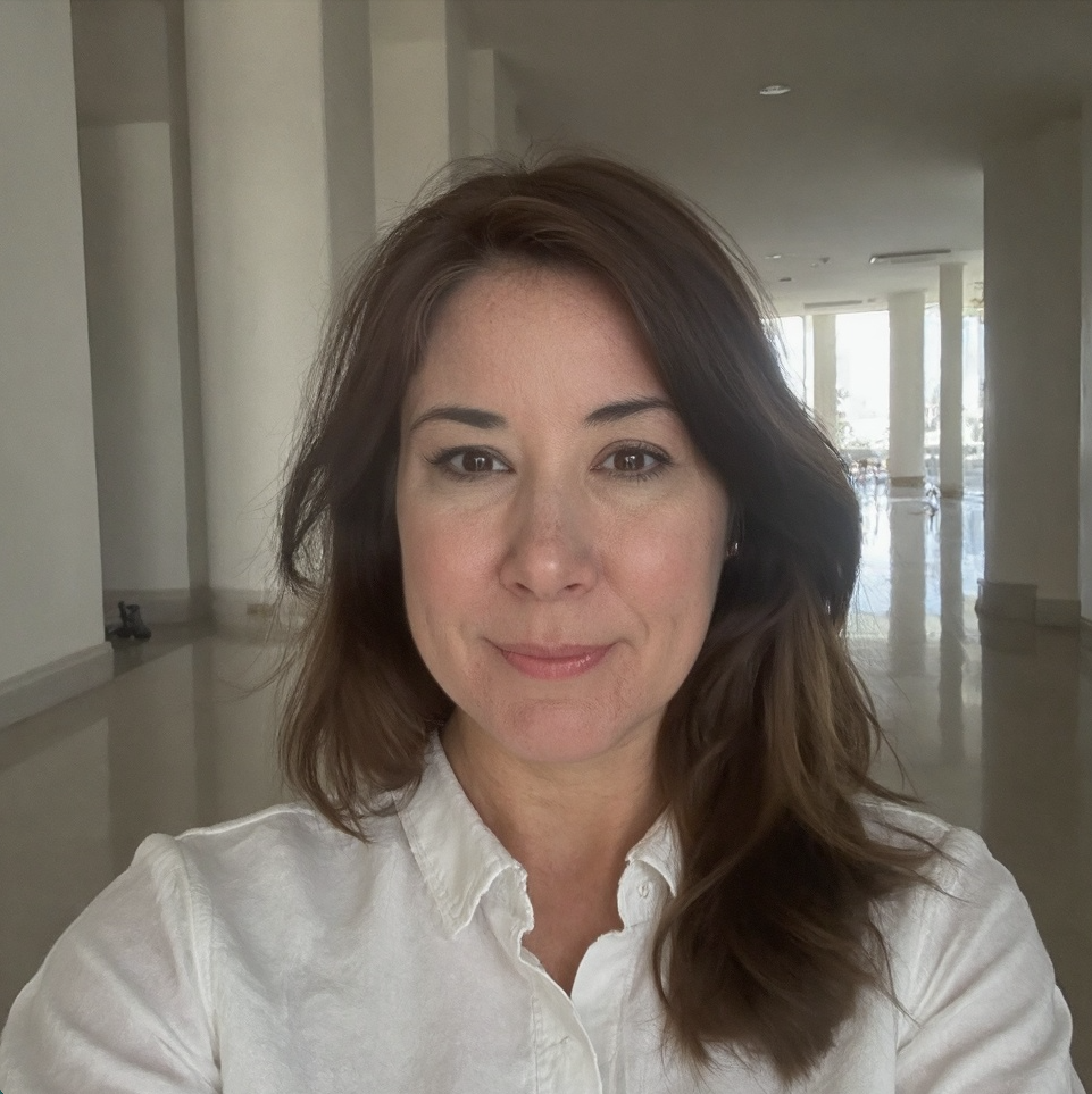
CEO
Ashley Lonie is the CEO and Founder of Teamed, a staffing agency dedicated to connecting organizations with top digital learning professionals worldwide. With a career spanning K–12 teaching, instructional design, and leading online learning innovation at the university level, Ashley brings deep expertise across the education and workforce learning landscape.
She is recognized as an innovator in education—spearheading the first university partnership with Audible, an Amazon company, to deliver custom audio learning solutions for busy MBA students. She also played a pivotal role in establishing SEI Studios, a high-end, story-driven production studio known for creating immersive, engaging learning experiences.
Today, Ashley is focused on reimagining and modernizing learning by building global professional connections that expand access to talent, improve the design of digital education, and help organizations deliver impactful learning at scale.











